Buying a Pontoon Boat or a Deck Boat?
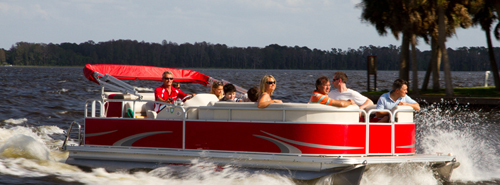
So, you want a versatile boat that handles easily, features plenty of seating and storage, and is designed to be able to bring along a big crew? Sounds like you may have already narrowed down your choices to two choices that are among the fastest-growing segments in the entire boating industry: pontoons and deck boats . Since the very first aluminum pontoon was introduced in 1958 at the Chicago World’s Fair (it was a Sanpan), boaters have been drawn to their unapologetically simple design, ease of use and the no-frills ability to get lots of folks aboard to get the party started. Back in those days, you broke out the folding lawn chairs, fired up the charcoal grill, and slowly putt-putted your tiny outboard to the nearest cove of like-minded revelers.
Similarly, the deck boat concept really started in 1974 when a company called Hurricane started building a fiberglass V-style hull to add better performance and handling, but still retain the a pontoon-style topside and wide-open floor plan that people loved so much about pontoons . It was so popular, in fact, that the first deck boat (called FunDeck) has been in constant production ever since. But my, how times have changed. These two boat types have come a long way and have been refined to the point that they really stack up against any other powerboat style. And today, they really go head-to-head when families are in the market for a new boat . Let’s examine the pros and cons of each.
Explore Deck Boat Brands Explore Pontoon Brands
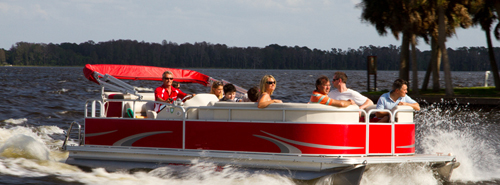
This is perhaps the most subjective part of comparing pontoons and deck boats , and it all comes down to your personal tastes and what turns your head. Today’s pontoons are tricked out with coordinated graphics, a choice of rail skin colors, high-quality vinyl seats, and tough and attractive marine-grade carpet. But since every inch of a pontoon is built for maximum seating and storage, some folks find them a little utilitarian. Today’s deck boats are designed similarly to other fiberglass runabouts, but with the bow section carried as far forward as possible to accommodate more folks in the forward seating area. You’ll see coordinated upholstery accents, bimini tops and carpet, and the exterior graphics tend to be a little bolder. Many deck boats also have integrated wake tower options, which adds a distinct watersports profile.
With a fiberglass, V-style hull, you typically would compare the handling of a deck boat to a similarly sized open-bow boat. Look for a stable ride at all speeds, little or no bowrise, and superior turning at higher speeds. The option of outboard or I/O propulsion is a big plus for deck boats as well, depending on your needs. Even with a full load, pontoon boats (by design) are going to plane easily with less horsepower than a deck boat. Sharp turns are helped by the addition of hydraulic steering systems, but you will still cut a wider swath in a pontoon, unless you choose a performance model with triple (center) tube system, which provides extra buoyancy and stability.

Versatility
Both styles of boats truly shine when it comes to the ability to do a lot of different things on the water. Fishing, watersports, cruising, camping, entertaining, etc. are all right in the wheelhouse of pontoons and deck boats. In fact, depending on your family’s needs, there are all sorts of different packages to dial in your preferred activities, such as rod holders, tackle storage and livewells for more hardcore anglers. If you’re like most folks considering one of these boats, though, you will find that the basic features will serve you well, and allow you to fish in the morning, pull the kids on tubes in the afternoon, and finish the day with a beautiful sunset cruise.
Ease Of Operation
In the world of trailer boating , you really can’t get much easier than pontoons and deck boats . With their stable platforms both are fairly easy to master when it comes to everything from launching and retrieving to cruising out on the water. Look for a raised helm or a captain’s seat that features a fold-up bolster to increase visibility. Pull-up cleats conveniently installed around the deck will make it a cinch to pull up and dock from any angle. Make sure you’ve got docking lights for bringing the boat in safely in the evening, and an all-off master switch to make sure you don’t run down your battery when you leave the boat.
Read Next: Deck Boat vs. Bowrider
You Might Also Like:
- Pontoon vs. Tritoon
- Small Boats: What Are My Options?
- Buying a New or Used Boat
- Boat Buyer's Guide: How to Buy a Boat
- Find the Right Boat for Your Lifestyle
Join Our Newsletter!
Get community news, buying bargains, and how-to guides at your fingertips.
Deck Boat vs Pontoon: Pros & Cons Explained
Pontoon boats and deck boats are well suited for similar activities and bodies of water, which leaves many boat buyers deciding between the two.
Each has characteristics that make them more suitable for some activities than others. Due to this, the choice of deck boat vs pontoon is often a difficult one.
Here, we explore the subtle differences so you can ask informed questions and make the best choice.
Table of Contents
What are the primary differences between deck boats and pontoon boats, the primary benefits of pontoon vs deck boats, which boat has more space, which boat is easier to handle on the water, is a deck boat or a pontoon boat faster, best boat for cruising, best boat for fishing, best boat for lounging and entertaining, best boat for watersports, which boat carries more people onboard, which costs more a deck boat or a pontoon boat, pontoon boats require less maintenance than deck boats, pontoon and deck boat comparison.
Both boats are great for exploring sheltered waters, enjoying various watersports activities, and bringing a crowd along.
The primary differences between deck boats and pontoon boats are the hull shape and construction material.
Pontoon boats are essentially platforms on top of two floating aluminum hulls, the pontoons, whereas deck boats have single, V-shaped hulls and are most frequently fiberglass construction.
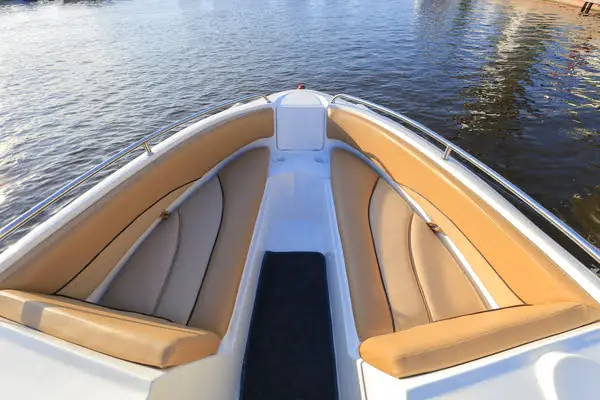
Let’s look at how these differences play out regarding performance, cost, handling, and features…
Both boats are excellent choices for gathering a crowd on calm waters and enjoying an array of watersports. Here’s a quick recap of their best qualities:
Pontoon boats:
- Are more stable
- Have a lower starting price point
- Hold more people per length
- Are easier to move around on
- Are more customizable layouts
- Are best suited for socializing and entertaining
Deck boats:
- Are the roomiest V-hull style boats
- Are more agile under cruise speed
- Have the more traditional “boat” look
- Have the option of outboard or inboard engines
- Are best suited for cruising and tow sports
If you are still confused about some of the different applications of these boats, the Automotive Training Center has a great resource that compares many different types of boats.
Both deck boats and pontoon boats are valued for their spaciousness.
But pontoon boats, because of their rectangular base, have the most room. And, because of the completely flat surface, they also have the most walking space and are the easiest to move around.
Deck boats, while roomier than most other molded fiberglass boats have less “walking” space. But they offer generous seating and lounging areas.
Although both deck and pontoon boats lend themselves to a variety of on-the-water activities, pontoon boats are more customizable . When purchasing a new pontoon boat, you will have many floorplan models to choose from.
Deck boats tend to come with fewer floor plan models.
This is because changing the molded seating and storage areas is much more expensive than rearranging the bolt-in-place style seating of a pontoon boat.
Both types of boats have voluminous amounts of storage. Everything from little cubbies for sunscreen and electronics to special-made lockers for skis and fishing poles.
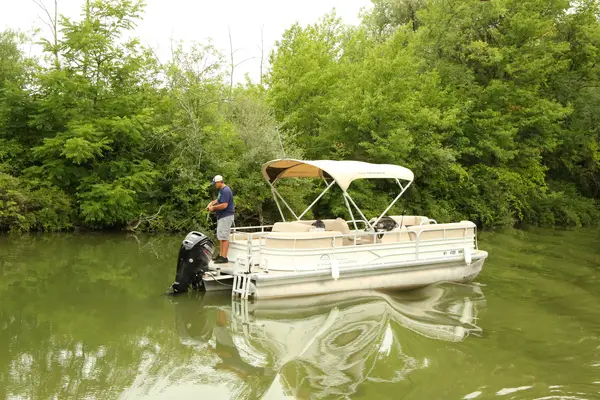
Pontoon boats are much more stable. The two hulls provide a solid surface both at anchor and while cruising.
Because of the V-shape, the deck boat is more tender when stepping aboard, maneuvering around turns, or cruising over choppy water. It will roll more in reaction to movement onboard and in the water.
One of the big differences between these boats is how they ride. The pontoon boat floats over the water and gives a more cushioned ride. However, the deck boat cuts through the water and slices through a wake with a smoother motion.
Pontoon boats will also provide a drier ride while underway than a deck boat. This is because it sits higher out of the water.
When comparing agility under cruising speed, the deck boat tends to be much more nimble. It can make sharp turns and quick reactions. Pontoon boats tend to make wider, gentler turns.
One great example of a nimble boat is the Carolina Skiff . Skiffs tend to be very agile and fast, however, they do come with their own specific list of pros and cons .
However, pontoon boats with twin engines can be much more maneuverable in tight conditions like docking.
They can even turn within their own boat length if the engines have separate controls. Deck boats frequently have a slower response at slower speeds. Some even tend to wander back and forth.
In the end, it depends.
When purchasing either a new pontoon boat or a deck boat, you’ll likely have the option to choose your engine packages.
Almost all pontoon boats are equipped with outboard engines. Often there is a choice to have two outboards, one on each hull. Outboard options range from 25 hp to over 300 hp.
You can easily expect to cruise at 40 to 60 mph on a well-powered pontoon boat, but the average cruise speed for pontoon boats is 30 mph.
Deck boats can accommodate larger engines. In addition, many come with the option of an outboard or an inboard engine.
Because of the larger engines, deck boats are usually faster than pontoon boats; many can reach speeds over 70 mph.
Which Is the Best Boat for How I Spend the Day on the Water?
The subtle differences between deck boats and pontoon boats give each an advantage for the different activities we enjoy on the water.
In broad terms, deck boats are best for action activities, and pontoon boats are best for entertaining. Let’s look at why…
Both boats are ideal for cruising around sheltered waterways.
Most deck boat interiors are designed for cruising with all the seats facing forward, which is more comfortable, especially at high speeds.
If cruising around the waterfront at a slower speed, the seating arrangements of a pontoon boat allow for facing each other and enjoying a conversation.
For going fast, the deck boat has more benefits. For cruising slow, the pontoon.
If throwing out the lines is the primary goal, most fishermen choose the pontoon boat over the deck boat because there is more room to cast or net your catch.
In addition, the railings make great attachments for rod holders, bait tables, and—for when you are lucky—grills.
If you are set on a deck boat, many models are specifically designed for fishing. They have features like flat bows that you can stand on for casting.
Because of their flexible arrangements and roomy platform, Pontoon boats are a natural winner when it comes to pleasing a crowd and just soaking up the day.
And because it is more stable and easy to move around, it can be a more inclusive option for families with young children or older members with mobility issues.
Plus, a pontoon boat provides the space for all the water-related goodies you want to bring aboard, like grills, bars, umbrellas, coolers, slides, paddleboards, and floaties.
But a deck boat, with its deep upholstered lounge seats to spread out on, still makes for a chill day on the water.
Just as the pontoon boat was the obvious choice for picnics on the water, the deck boat is more prepared to handle a day of skiing and other pull-behind watersports.
Deck boats are the top choice for a few reasons. They are usually faster, but also, because of their V-hull, they can put up a wake making it more fun for skiers and tubers. The hull also provides a sharper turn, adding to the excitement.
Pontoon boats, given a large enough outboard motor, will also provide plenty of power for tubing and skiing for the casual family outing. Still, the more experienced skier may find the ride underwhelming.
If wakeboarding is the primary attraction, the deck boat will perform more like a ski boat than a pontoon boat.

For the boat’s length, the pontoon boat fits more people than the deck boat.
However, both boats carry more people than other similarly sized boats.
Large pontoon boats can easily carry 15-18+ people onboard— quite a party . Deck boats, on the other hand, start to handle about 12 people onboard at about 25 ft in length.
In general, pontoon boats are more affordable than deck boats when comparing base models.
However, the price of the engine (or engines) can account for nearly 50% of the total cost of the boat.
The more horsepower, the higher the cost. Also, inboard motors, which are an option for deck boats, are usually more expensive than outboard motors.
Besides having options for engines, both deck boats, and pontoon boats come in a range of styles—from utilitarian to luxurious. The line between which type of boat costs more becomes blurred at the upper end of the spectrum .
For starting prices, expect to pay $15K-$60K+ for a pontoon boat and $30K-$80K+ for a deck boat.
If you are daunted by the price of a good deck boat, one way to get around the issue is to buy a used one . Buying a used deck boat from a reputable source is a great option!
In addition to the initial costs of the boat and motor, maintenance costs should be considered when determining the actual cost of buying a boat.
Pontoon boats will generally require less maintenance because their aluminum hulls require little care . In contrast, the deck boat’s fiberglass hull requires seasonal buffing and waxing. Fiberglass nicks and dings also require more skill to fix.
The one precaution to note is that aluminum is more corrosive in salt water than in freshwater. Some manufacturers have special saltwater packages, so inquire if you live in a coastal area.
Pontoon boats and deck boats are both excellent options for sharing a day on inshore waterways with a large number of people.
The primary benefits of the pontoon are its stability, affordability, and larger passenger capacity.
The primary benefits of the deck boat are its more traditional appearance, better performance for watersports activities, and speed

Growing up in Florida, I’ve been surrounded by saltwater my entire life…and I love sharing my passion with others.
To learn more about why I started Saltwater Mecca, visit the ABOUT page.
Thank you for reading this article. Browse around & have some fun!
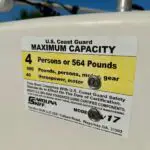

Pontoon vs. Deck Boat: What’s the Difference?

Table of Contents
Many boaters choose to purchase a boat based on the water activities they want to do. If you’re interested in comfortably cruising around the shoreline with some snacks, your favorite beverages, and a bunch of friends or family, then a pontoon or deck boat may be the boat for you.
But still, they’re different boats. In this post, we’ll give you a close look at the differences between pontoons and deck boats .
Try before you buy— Rent pontoons and deck boats at Boatsetter
What is the difference between a pontoon and a deck boat?
As the name suggests, pontoons are based on a platform of large aluminum tubes with a deck on top that supports the upper structural components, seating, and other features.
Pontoon boats are commonly found as small as 18 feet in length and as large as 28 feet. They feature a large, open deck surrounded by seating with easy access from the bow or stern and often one side of the boat where passengers can step directly onto the deck.
Although pontoons were originally built with two tubes placed at the outboard edge of the deck, modern pontoons have a third tube in the center. This allows boat builders to mount larger or twin engines, for more strength and rigidity.
The third tube and bigger engines also make these boats faster with better handling and strong enough to tow wakeboarders and skiers.
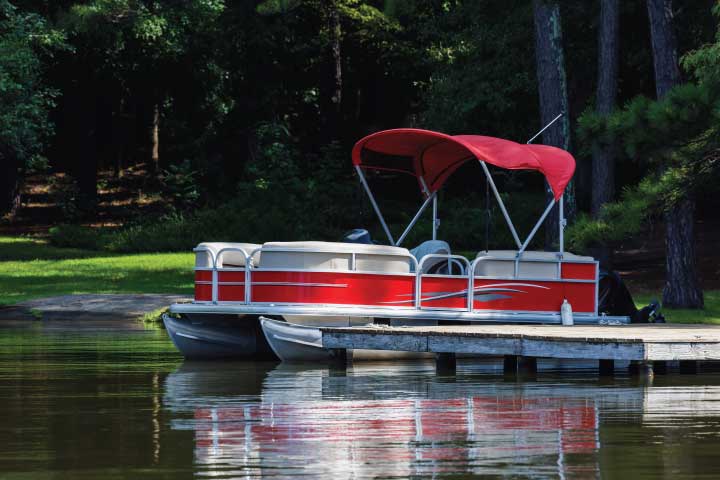
If a pontoon boat has a deck, then what is a deck boat?
Although both were built to accommodate large groups, deck boats are built on a more traditional fiberglass V-shaped hull , while pontoons are built on aluminum tubes .
While the latest pontoons have new tube designs and come close to performing comparably, a deck boat’s traditional hull design still rides better in rough waters, cruises more comfortably, and handles better than a pontoon boat .
The traditional hull design also creates a better wake that meets the wants and needs of wakeboarders and skiers. They can also be equipped with trim tabs and other options designed to create a bigger, more desirable wake.
It also provides additional power options! While pontoon boats are most commonly powered by outboard engines, deck boats may be equipped with inboard/outboard , or I/O, engine packages and outboards.
Deck boats with inboard/outboard engine packages can also provide a larger, more accessible swim platform for entering and exiting the water.
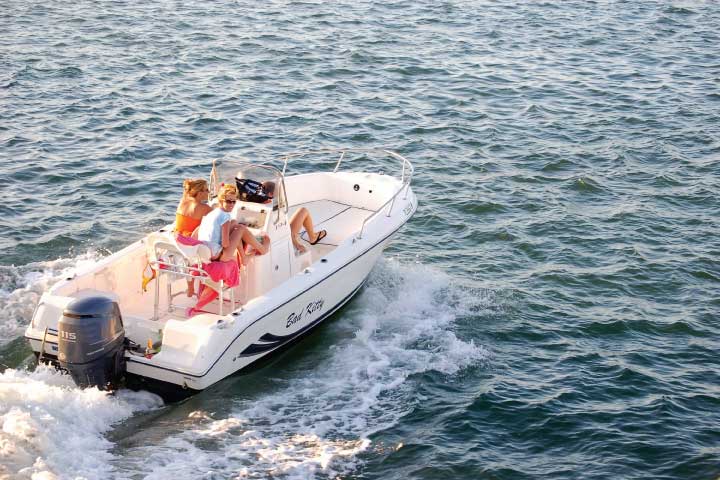
READ MORE: Buyer’s Guide: Best Deck Boats
Similar in style. Different in design.
While both styles of boat can include lots of storage, coolers, audio systems, and fishing features and make either a great choice for a fun, memorable day on the water, they are very different in design.
Look up deck boats on Google Images . They’re sleek and more closely resemble a runabout boat, while pontoon boats resemble, well, pontoon boats.
Check out the hottest boats in the market at Boat Types , and scroll through Boat Guides to find your next boating destination .
Boatsetter is a unique boat-sharing platform that gives everyone — whether you own a boat or you’re just renting — the chance to experience life on the water. You can list a boat , book a boat , or make money as a captain .
List. Rent. Earn— Only at Boatsetter

Chuck Warren fell in love with boats at 9 years old while helping to restore his grandfather’s 1939 44-foot Elco cruiser. A lifelong boater, Chuck has experience operating large and small vessels on the waters of the Atlantic, Gulf of Mexico, Caribbean, and the Great Lakes.
During his 35-year marine industry career, Chuck has been the driver for several offshore powerboat racing teams, the chief engineer aboard a Caribbean research and salvage vessel, captain of a Florida Keys sunset cruise, and more.
Today, Chuck is a boating industry writer, copywriter, and captain who lives on his 40-foot boat in the summer when he isn’t delivering vessels around the Great Lakes or teaching new boaters to drive. Winters are split between the West Michigan lakeshore and wherever his travels take him.
Browse by experience

Explore articles

Lake Conroe (TX) Fishing Guide
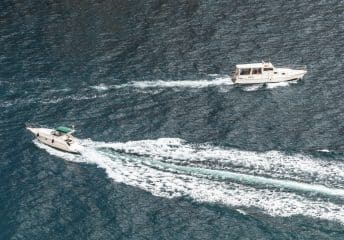
Who Is Responsible for Avoiding a Collision on the Water?

Sailing 101: A Beginner's Guide

How to Tow a Tube Safely
- English United States - English
- English Canada - English
- Français Canada - Français
- Create Account
- Account Home
- Check Order Status
Deck Boat vs Pontoon: Which is Best For You?

When it comes to on the water family fun, plenty of seating is vital. The two best boats designed with comfort as their primary characteristic are pontoons and deck boats. If you are looking at these types of boats, you may be wondering which is right for you. This guide will help answer the most common questions prospective boat owners have.
What is a Pontoon?
Gaining in popularity over the years and now sure to dot lakes and rivers across the country, pontoon boats are distinguished by having two or three hulls providing incredible stability with a flat deck connecting them. The wide deck space gives manufacturers plenty of flexibility to arrange furniture and accessories to suit any activity or interest, from watersports, to fishing, to lounging and entertaining.
Pontoon Boat Types
The best way to determine which type of pontoon boa t is right for you is to start with a clear idea of where you will be boating and how you most like to spend your time on the water. Pontoons and their three-hull cousins tri-toons can vary in design and cost. They can range from basic all aluminum models for the budget conscious to luxury versions with molded fiberglass sections for a sleek and beautiful aesthetic. Many manufacturers have useful resources to help guide you through the process of deciding which model you may want to focus on.
Capacity & Sizes of Pontoon Boats
Where pontoon boats really shine is the stability of the platform makes them able to carry a lot of weight, which translates into a high passenger capacity and room for the whole family. Most manufacturers have models ranging from 17-18 feet on up to 25-26 feet. Even a modest 17-foot boat can carry eight or nine people, significantly more than a comparable center console. A 28-foot pontoon could easily carry 15-18 people, with plenty of room for gear, food and beverages. Most pontoon manufacturers have very detailed websites that help you understand how pontoon boat sizes impact the number of people you can bring with you on your next adventure.
Boat Activities & Uses
Manufacturers produce many different models tailored to the specific activities their customers prefer. For example, high-performance, twin-engine versions are perfect for tow sports. Fishing models are equipped with ample storage and special seating that allows for easy casting without getting in the way of other anglers. If your idea of time on the water involves laying out and enjoying the sunshine, lounge versions have seating that lets your guests stretch out. For those less concerned with the destination and more interested in the journey, cruising pontoons have a variety of seating options and stern swim pads for the ultimate in flexibility. Luxury models may be equipped with LED lighting, high-end sound systems and even a bar for entertaining .
Pontoon Boat Engines
Pontoon boats of the past used to be floating barges with minimal engines that would gently push these floating parties around. As outboard technology has developed, pontoon manufacturers have taken advantage of higher horsepower and adapted their hull designs to perform with the added speed and maneuverability. The shape and stability of pontoon boats also are perfect for twin engines and with a wide beam, the engines can be mounted wider apart for better low speed maneuverability and ease of docking that will leave most powerboaters jealous.
What is a Deck Boat
Building on the incredible layout options of pontoon boats, deck boats offer exceptional comfort, but on a more traditional powerboat hull. This innovative design lets guests enjoy the comfort of ample seating, with the maneuverability and cornering of a center console. The more aerodynamic hull design also handles slightly rougher water and provides a drier ride.
Deck Boat Types
Like pontoons, deck boats come in a variety of layouts and designs based on the primary activity. Deck boats can be set up for lounging with a bow rider layout, sport models for towing, center console versions for fishing and there are even models that look just like a pontoon from the deck up if you are interested in cruising or entertaining.
Layout & Sizes of Deck Boats
Most manufacturers produce a variety of sizes and like pontoons, the size of the vessel impacts capacity. Ranging from 18- to 26-feet, deck boats have a maximum passenger capacity of between 9 and 14 people. With a molded fiberglass construction, deck boats have excellent storage for gear and water toys, with compartments under the seats and in the deck.
Deck Boat Engines
While pontoons rely solely on outboard propulsion, deck boats stand apart in that they can accommodate either an outboard or an inboard/outboard engine. The inboard/outboard engine is housed inside the hull, with just a sterndrive in the water. This allows for an uncluttered back deck which is ideal for lounging, easy water access for swimmers and clear sightlines for watching water skiers.
Purchasing a Pontoon vs Deck Boat
Regardless of which design is right for you, the purchase process of either a pontoon or deck boat is similar. Once you decide which type of boat is right for you and your family, your primary on-the-water activity and the body of water that you intend on and the layout and size you prefer, it’s time to find a dealer for either your new pontoon or deck boat and start your purchase.
Cost of Pontoon Boats
The cost of a pontoon varies, and you can find models that range from affordable to extravagant. Most manufacturers offer online resources for estimating the cost of your new boat. They also offer online boat builders that let you add options to see what the end price should be. Keep in mind that the base cost of a pontoon doesn’t include additional considerations like optional equipment, water toys, safety gear, trailer or towing equipment, covers and storage. All major manufacturers offer financing for new purchases, and it is best to work with your dealer to find the right option for you.
Cost of Deck Boats
Like pontoons, deck boats vary in prices based on length, layout and options. Since they are more utilitarian than the higher end pontoon boats, deck boats typically are a little more affordable than the most expensive pontoons. Inboard/outboard deck boats will be a little more expensive than comparable outboard powered deck boats. Of course, additional equipment will add to the overall cost of the boat.
Once you buy your new boat, it’s time to add all the fun toys that will complement your experience. If fishing is your favorite activity, shopping for poles and lures are next on your list. Water sports enthusiasts should be looking for snorkel gear, tow ropes and water skies. For those looking to cruise, there are plenty of toys to help you just relax. Once you have all of your accessories, it’s time to get out there and have fun. After all, that’s why you started this process in the first place.
Pontoon Boats
- Personal Watercraft
- nauticalknowhow
- Nautical Knots
- Tools and Calculators
Deck Boat vs Pontoon Boat: Key Differences and Similarities
When it comes to versatile boats that are ideal for family outings, fishing, cruising and more, you may find yourself eyeing both deck boats and pontoon boats . They offer a lot of the same benefits and features, but they’re definitely not the same thing. A pontoon boat is, first and foremost, a boat that uses aluminum or inflatable tubes (pontoons) to stay afloat. A deck boat is designed to have a large amount of deck space, but still has a hull similar to traditional boats. Let’s take a look at the other key differences and similarities between deck and pontoon boats
Differences Between Deck Boats and Pontoon Boats

There are several key areas I’ve identified in talking with some boaters that they are concerned with when it comes to the differences between a pontoon vs deck boat that include:
Maintenance
- Style & Design
- Stability & Function
Ease of Use
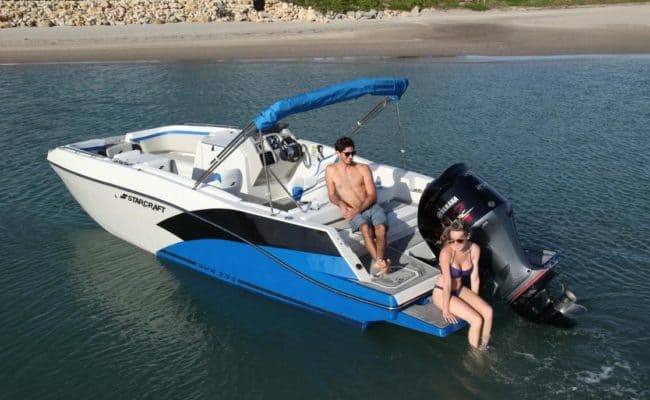
How much is a pontoon boat or a deck boat?
Boat costs are rarely held to any hard and fast rules. There are yachts out there that cost billions. You can probably find a good secondhand jon boat for just a couple hundred dollars. So there’s a big range. But, if we’re looking at costs in general, I’d say you can probably find a pontoon boat cheaper than a deck boat of similar size and quality.
A brand new 20 foot Bass Buggy pontoon boat might set you back a little under $25,000 . Pontoon boats have gone up in value and some top of the line pontoon boats with high quality features may end up being as much or more than similarly outfitted deck boats. A 24 foot Party Barge pontoon boat with an 11-person capacity can set you back $52,000.
A 21 foot Bayliner Element Deck Boat starts at around $35,000 . The cost will significantly increase as the size of the boat goes up. The Starcraft SCX I/O 211 Surf can take a dozen people out for a day of wake surfing but will set you back around $75,000 .
These are just a couple of examples, of course, and we’re looking at manufacturer process. The fact is that costs have changed a lot in recent years compared to 10 or 20 years ago. So, in general, a pontoon boat is cheaper and most deck boats typically cost a little more. But do your homework on this as prices can vary wildly based on:
- Manufacturer
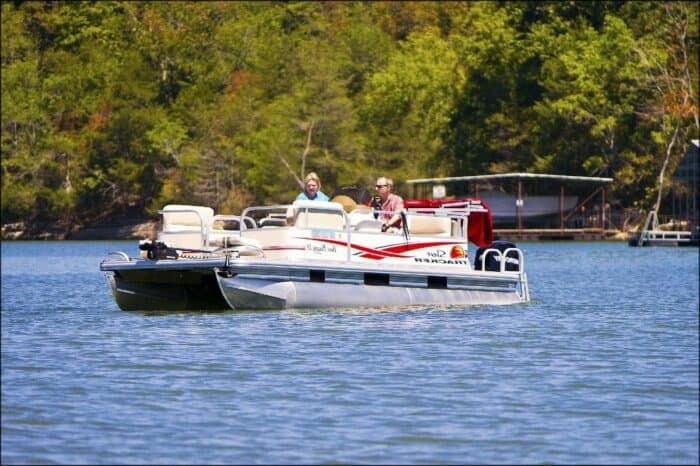
How fast do pontoon boats and deck boats go?
Neither a pontoon boat or a deck boat uses speed as a main selling point. That said, different models can still achieve the speeds you’ll want to accomplish most of the activities boaters enjoy on the water.
The average speed of a pontoon boat is around 30 miles per hour. But keep in mind that this average is calculated across a wide range of boats. Some smaller leisure craft only have enough horsepower to hit 10 mph to 20 mph. That’s a pretty slow boat. But there are some high performance tritoon boats that can get up to 50 mph or more. In general I’d say pontoon boats aren’t built for speed, though.
Finding a deck boat that can easily hit speeds of 70 mph is not hard at all. A deck boat can of course suffer the same fate as engines can have low horsepower and low output for them as well.
If speed is the name of the game for you, then a pontoon boat probably won’t be able to meet your needs. However, either vessel should be able to handle the speed needs of most boaters.

What are the primary uses of pontoon and deck boats?
This is always a big concern. People who buy a fishing boat have a pretty clear intention in mind for their boat, right? And if you buy something called a Party Barge it’s not hard to guess what that’s for, either. But a lot of us want versatility in a boat.
Back in the day a pontoon boat had a lot less going for it than a deck boat in terms of activities. The power just wasn’t there. So while a pontoon boat has always been a solid option for things like leisure cruising or fishing, it did lack in the more intense parts of fun on the water, namely water sports. Nowadays it’s more than just a stable platform, it’s a versatile boat that offers a smooth ride for your passengers, your fishing gear, and lots more.
Pontoon boats today can and do have the horsepower to kick things up a notch. Your optimal speed for things like water skiing is usually around 25 mph and tubing is best done at a lower speed. Some smaller pontoon boats will not have the power to pull this off but most models are more than able to handle this. A pontoon boat motor putting out 150 horsepower should be more than capable of managing water skiing.
Now, are you entering an extreme sports competition being towed behind a pontoon boat? Probably not. There are tritoon boats out there, that is a pontoon boat with a third tube underneath, that put out serious horsepower and can get up to 40 mph and even 50 mph, however. They cost a lot more, don’t doubt it, but they have power. But for casual fun with the family, you can tube, wakeboard or ski just fine with a pontoon boat.
Pontoon boats are also great for leisurely cruising and less intense activities like fishing. Because of all the space on deck for both people and gear, these are ideal.
You can get a deck boat that can give you more power for less money overall if your heart is really set on kicking up some wake so you can have some fun in the water. I would say, with a new boat and the way most people are interested in skiing or tubing, both boats offer great abilities but a deck boat may edge out the pontoon for intensity.
If you’re looking for a solid fishing and leisure boat, deck boats also excel in this regard. Pontoon boats generally have more room because of how the deck is laid out, and offer greater stability as well, but a deck boat is no slouch. There are few uses you can come up with for one kind that you can’t do with the other boat.
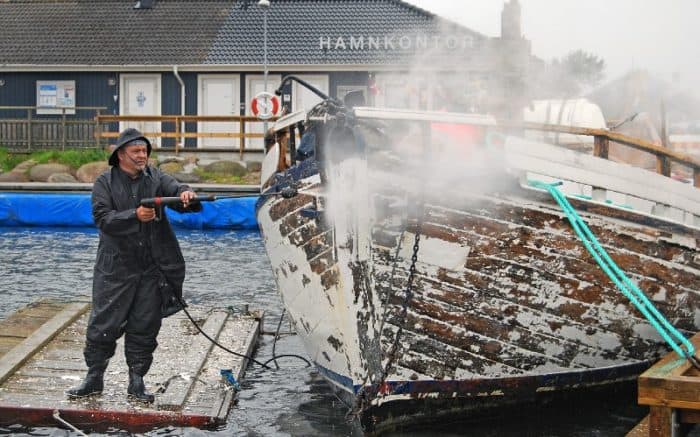
How much time, effort and money do you need to put into keeping your boat in good working order?
Maintenance is a place where I’d say you’re likely to notice one of the bigger differences between these two boats. Neither one represents any big or unique challenges to maintain, but there are clear differences.
A pontoon boat is a lot easier to clean and maintain because the aluminum pontoons are very simple to deal with. The cleaning process is relatively fast and simple compared to fiberglass boats. But you do need to keep them clean. An unclean boat hull will slow both boats down but you’ll start to notice it a lot more with a pontoon boat. Let that growth go too long and it can start to feel like you’re dragging anchor the whole time.
Another bonus for pontoon boats is that, if there’s a more serious problem, you can just remove a pontoon. This can be done for repairs or replacement. If you have a spare you can literally get right back to boating. No such luck with a deck boat which will require far more in depth and costly repairs.
Your deck boat, as with many other boats, has a fiberglass v style hull. It has a gel coat on it and that needs to be protected. Over time, growth of algae, barnacles, and just general pollutants can stain the coat and break it down. If you’ve ever had to clean a boat hull, especially one that was lacking in maintenance, you know what a chore this can be. Damages to a fiberglass hull will likely take more time and more money to fix than those in a pontoon.
Style and Design
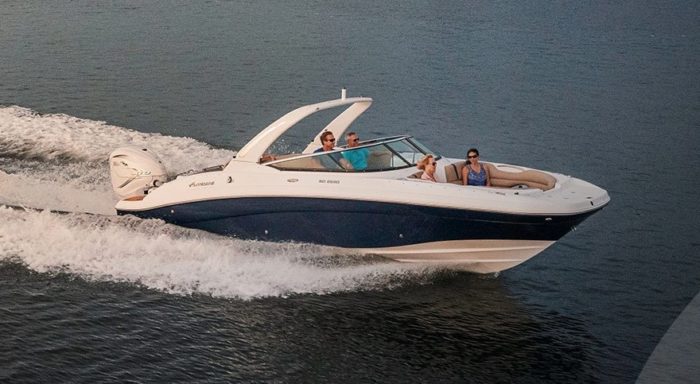
Difference in boat design and construction?
This is a more important feature than some people realize at first. The technical aspects of a boat, the cost, and how you use it are all greatly important to be sure. But how it’s made and how it looks are big points simply because you want a boat that is well made and that you like the look of.
Most pontoon boats are squared off at the front, or at least flatter. Some deck boats do have more of a rounded front than the traditional, sharp V point you’ll see on many vessels, but the shape is usually closer to what you might picture in your mind when you think of a boat.
Your major design difference is that the pontoon boat is set on pontoons. Instead of that V-hull you have two, or sometimes three, aluminum tubes that offer stability and buoyancy to the boat. Because of how the pontoons create buoyancy, the deck of a pontoon boat can offer maximum space for crew and gear.
Deck boats have a decent amount of deck space, hence the name. The bow area allows for extra seating, just like a bowrider, but this is still a v-hull boat. Because of the shape and design of the hull there will be less space overall than a pontoon boat of the same length. That said, a deck boat also has the traditional lines of a boat that some people really like. It’s totally subjective in terms of what you like the look of, of course.
Modern boating being what it is, both kinds of boats can come with all manner of tricked out design features from lights to upholstery and carpeting. Pontoon boats had a much more utilitarian look back in the day. To be honest, a lot of them were pretty plain or ugly. But design innovations and effort has moved the bar so you can get a really slick looking design on either kind of boat.
Stability and Function
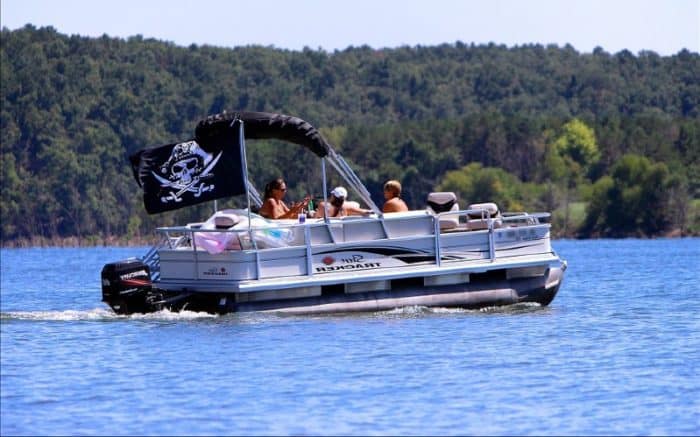
How well does the boat perform on the water?
This is one of the areas where pontoon boats and deck boats shine but display their differences. The reason a pontoon boat has pontoons really comes through when you compare the stability and function of one to a boat like a deck boat.
A pontoon boat will likely not be as fast as a deck boat, but it’s also a lot better on fuel. The pontoons float on top of the water rather than having a hull cutting through it. So there’s less resistance against the whole boat. Because a pontoon boat rests on pontoons above the water, the deck is often far more stable. You’re still subject to the effects of waves and wind, but the entire boat doesn’t shift back and forth with the motion. A lot of people who suffer seasickness find pontoon boats to be more easy to deal with.
Pontoon boats handle a little clumsier in the water, especially if you’re using two pontoons instead of three. If you want to do a 180 turn, for instance, you’re cutting a pretty wide path to circle back. Three pontoons make it easier by giving superior stability and buoyancy. If you try sharp turns at speed in a pontoon boat, the momentum will cause everything and everyone on the deck to fly in the opposite direction, which of course you don’t want. So you need to handle turns with more caution in a pontoon boat than you would on a deck boat.
A pontoon boat can plane a lot more easily than a deck boat. This is true even when you have a pontoon boat loaded up with gear and passengers. That’s a spot you need to be wary of, however, as some pontoon boat owners forget their maximum capacity pretty easily. The downside to all that deck space is that sometimes you can forget how much you’re able to carry. If you’ve ever heard of a party boat sinking on a lake or a river, oftentimes it was a pontoon boat that took on too many people because there was room for a lot of people, but it couldn’t handle the weight of all of them.
Because a deck boat has a v-hull, deck boats offer the ability to cut through the water really quickly and smoothly. That means when you hit those outboard motors, you’re going to get a deck boat moving fairly quickly. The acceleration is going to be far superior to that of a pontoon boat. It will also likely be able to maintain higher speeds as well. A trade off here comes in the form of stability. Everything on a V shaped hull rests on the point of the V, which means the boat can rock from side to side. If wind or rough seas hit, the boat is more likely to rock back and forth.
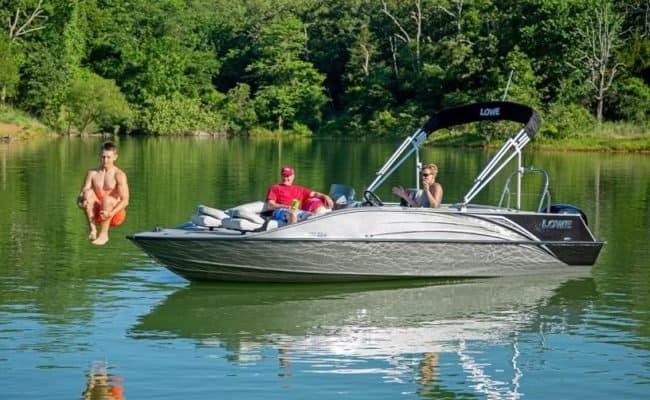
How easy is it to get behind the wheel and get on the water?
Boats all function “more or less” the same, but that “more or less” is carrying a lot of weight. The difference between a bass boat and a yacht may be significant. Or a kayak and ski boat , for that matter. Deck boats and pontoon boats are not too different in terms of operation. The difference is felt more in the handling of them. Because of the different hull types, the way the boat feels and responds on the water is the biggest variance that takes some time to get used to.
In general, driving either a pontoon boat or a deck boat is on the easier end of boating. The controls are fairly simple in terms of when and hot to throttle or trim the engine. Turning is probably the hardest thing to fully master with a pontoon boat but by no means is it hard to do, it’s just a different feel than what you may be used to with other boats.
Deck boats operate in much the same way as any other boats. Nothing stands as as particularly unusual or specific in terms of operating one. If you’ve had no issue with other boats, a deck boat should be no trouble.
The Bottom Line
Pontoon boats are generally cheaper to buy but slower overall. They offer greater deck space and more stability on the water. Fuel efficiency can be superior in a pontoon boat, and maintenance is usually easier as well.
Deck boats handle like most other boats. They offer greater speed and are ideal for a wide array of activities. They tend to be more agile on the water, and offer a snappier ride overall.
Neither boat stands out as being “better” than the other by any significant metric so choosing between them definitely comes down to personal factors like your own budget, style preferences, and what you need to use them for. In the end, these are both solid boat styles, however, and you’re likely to enjoy your time using either.
My grandfather first took me fishing when I was too young to actually hold up a rod on my own. As an avid camper, hiker, and nature enthusiast I'm always looking for a new adventure.
Categories : Boats , Pontoon Boats
Leave a Reply Cancel reply
Your email address will not be published. Required fields are marked *
Save my name, email, and website in this browser for the next time I comment.
More in Boats
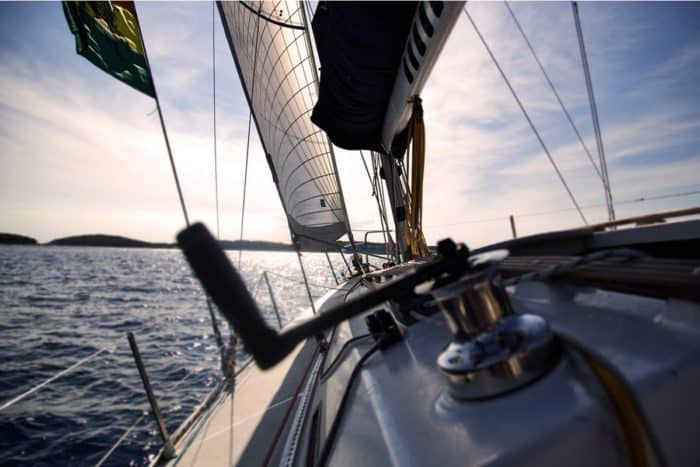
What Is A Gunwale?

131 of the Best Hawaiian Boat Names
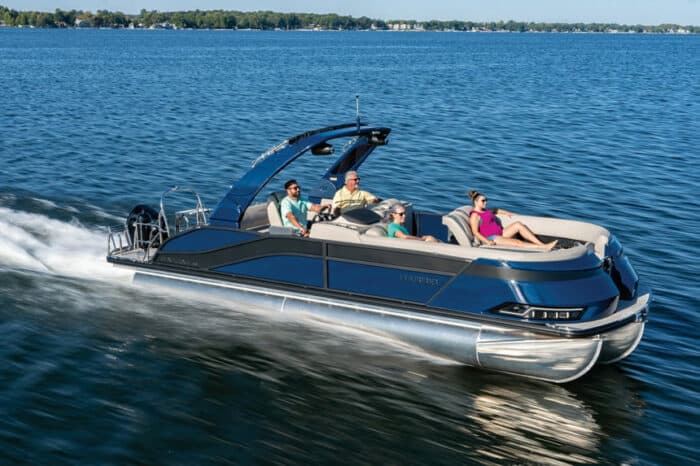
167 Patriotic Boat Names
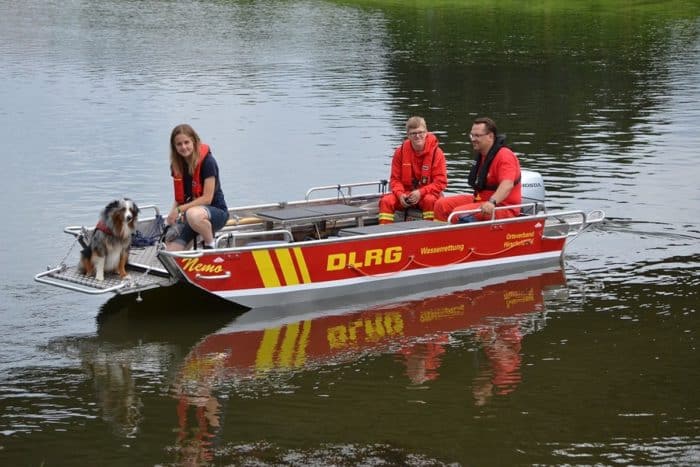
The 138 Best Boat Names for Dog Lovers

The People’s Poncho Review and Ratings

Oru Lake Kayak Review

About Boatsafe
Established in 1998, BoatSafe is your independent guide into the world of boating, fishing, and watersports. We provide expert insights and detailed guides to help you find products tailored to your needs and budget.
Contact Boatsafe
- Address: 4021 West Walnut Street. Rogers, AR 72756
- Phone: (479)339-4795
- Email: [email protected]
Site Navigation
- How We Test
- Corrections Policy
- Privacy Policy
- Terms & Conditions
- Editorial Policy
- Affiliate Disclosure
Our Reviews
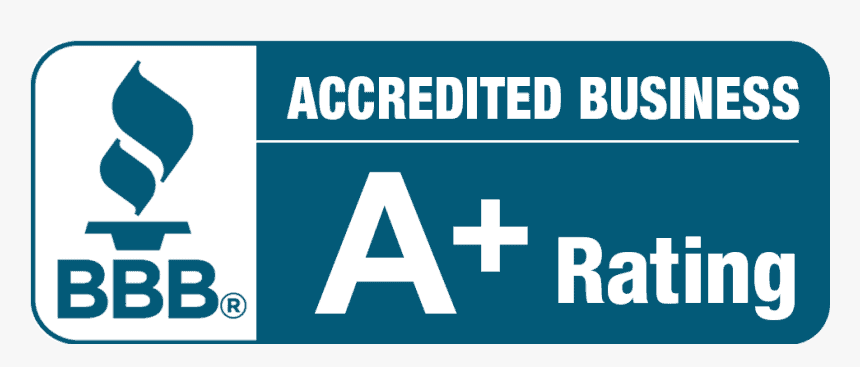
All content is © Copyright 2024. All rights reserved.
- Articles and Guides
Deck Boat Vs Pontoon Boat: Which is Better?
22nd jul 2023 by lenny rudow.

Which is better, a deck boat vs pontoon boat? We take an in-depth look at the difference between the two.
The main difference between a deck boat and a pontoon boat can be found in one simple technical factor: deck boats have a single rigid hull, while pontoon boats have a deck riding on pontoons that act as the hulls. Beyond this, the two boats serve relatively similar functions and niches in the boating world, yet there are numerous details that can make one or the other the best choice for different people. Which will be the best choice for you and your family? To answer that question, let’s take a deep dive into the deck boat vs pontoon comparison.
Differences Between Deck Boats and Pontoon Boats
As we mentioned, along with the different hulls there are lots of things that set these types of boats apart. One big potential difference is that most deck boats are constructed of fiberglass, while most of the pontoon boats for sale on today’s market are made from aluminum. We say potential, however, because there are some exceptions. In a number of cases you’ll see aluminum deck boats and on rare occasions you’ll also find a fiberglass pontoon boat—although generally the “pontoons” and the bridge between them consist of one molded part, which arguably could make them power catamarans.
If you look at overhead pictures or layout drawings of a deck boat vs a pontoon boat, in some cases it can be tough to tell the difference. So beyond construction materials, what else sets these two types of boats apart? Let's look through the lens of the pros and cons between deck boats and pontoons.
Deck boat pros
- The larger surface area of a deck boat’s single hull provides more buoyancy, so deck boats are better weight-bearing platforms and commonly have higher weight and passenger capacities.
- Deck boats tend to handle large waves better, in part because they have more buoyancy in the bow.
- Most deck boats have a sportier feel to their handling than pontoon boats.
- Deck boats have more integrated features (like built-in seat bases, coolers, and consoles), as opposed to bolted-on accessories. This means less squeaking and creaking when running through waves, and it helps improve longevity.
- Choosing a deck boat can be easier, because there tend to be fewer available layouts.
- Many people feel that the look of slick gel coat is much better than those of bare or painted aluminum.
Deck boat cons
- Due to the fiberglass construction, deck boats commonly weigh more than pontoon boats—sometimes a lot more. (Aluminum models may be an exception.)
- Deck boats offer much more limited choice when it comes to layouts.
- Fiberglass boats need waxing, and that includes deck boats.
- Molded fiberglass gunwales are wider than aluminum fences, and some deck boats narrow a bit towards the bow, so pontoons of equal length and beam often have a bit more room inside.
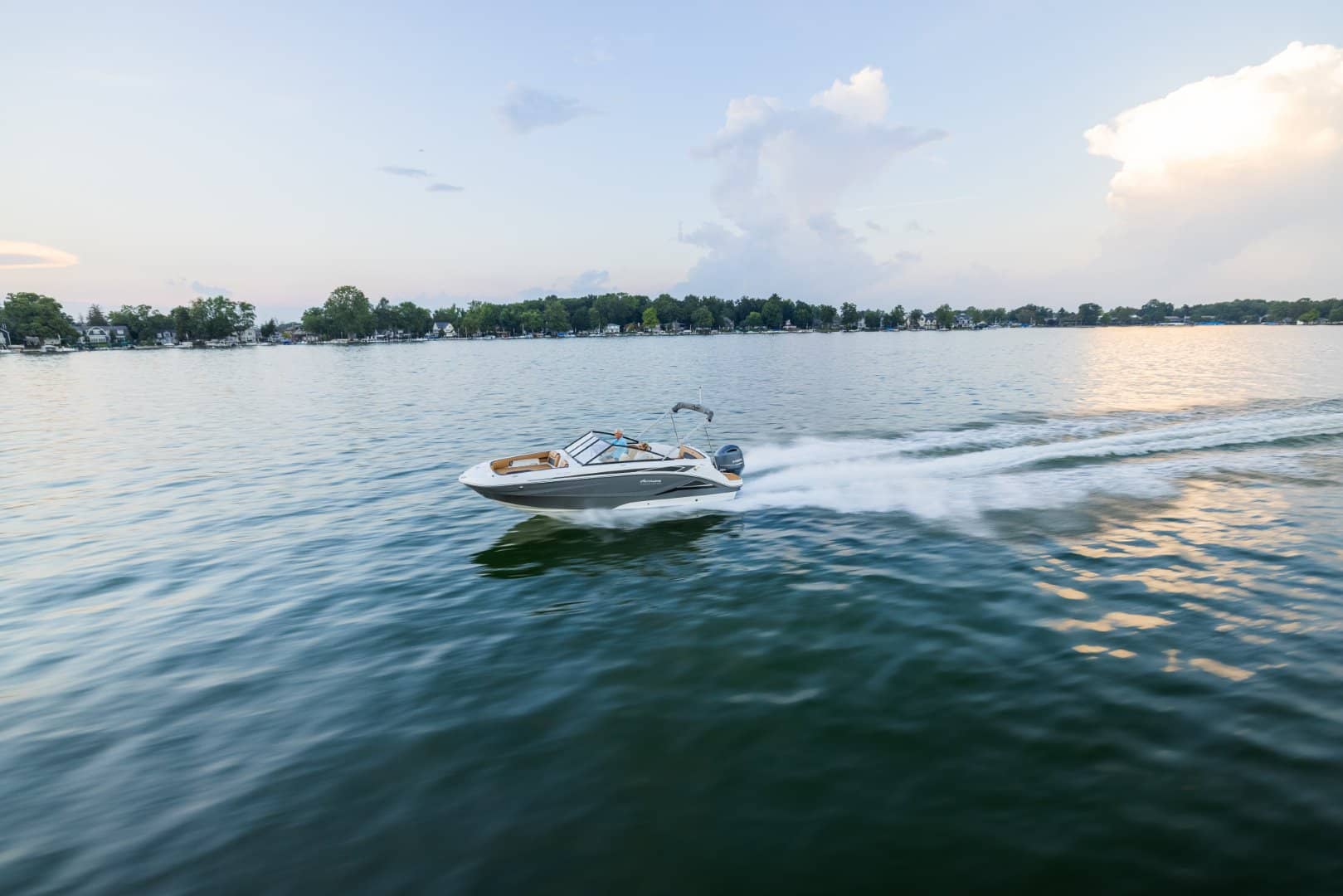
Photo credit: Hurricane Boats
Pontoon boat pros
- Pontoon boats offer the ultimate in choice and semi-customization. In many cases, you’ll have a dozen or more furniture layouts to choose from in a single model line.
- Many pontoon boat manufacturers offer models in both pontoon and “tri-toon” forms (tri-toons have a third pontoon running down the middle), so you can opt to spend more or less depending on what level of performance you want.
- The tall “fences” surrounding the deck of a pontoon boat are great for keeping kids and pets secure.
- The lighter weight of pontoons means it’s possible to tow them with a smaller vehicle.
- Maintenance is limited to cleanup and fixing things that go wrong.
- Pontoon boats maximize usable space.
- Most pontoons have platforms at both bow and stern for boarding.
Pontoon boat cons
- Pontoon boats aren’t the best choice for rough water.
- The life expectancy of a pontoon boat is generally shorter than that of a molded fiberglass boat.
- Since most pontoons have rotomolded seat bases, which don’t fit as exactly as fiberglass parts, most of the storage areas aren’t entirely waterproof.
- Some pontoons are made strictly for freshwater use and parts may suffer from corrosion issues if used in saltwater environments.
- Because of the tall fences and shallow, rounded pontoons, pontoon boats can get caught by the wind and blown around more easily than many other types of boats.
- Handling tends to be less sporty than that of a monohull.

Deck Boat Vs. Pontoon Boat Performance
A boat’s performance is, of course, considered critical by many people. Deck boats generally hold a performance edge, especially in the way they carve sharp turns and crisply jump onto plane. And many can travel at up to highway speeds. That said, while pontoon boats from decades past were relegated to mushy handling and slow speeds, today many can rival a fiberglass monohull when it comes to sheer speed. As a rule, these will be tri-toon pontoon boats, because having the third “log,” as it’s called, beefs up the boat’s structural stability, adds buoyancy, and allows for the use of higher horsepower engines.
But not all boaters feel the need for speed. Some people plan to meander down a lake or river and aren’t in any rush, and for these folks, there are plenty of low-horsepower pontoon boats out there. These cost less, burn less fuel, and have lower maintenance costs. Most of the time you see deck boats for sale , on the other hand, they’ll be powered to cruise fast and low-horsepower options are few and far between.
Deck Boat Vs. Pontoon Rough Water Handling
Rough water handling is another area where deck boats have the edge, which is one of the reasons why you’ll see deck boats on all different types of waterways while pontoons are rarely seen outside of lakes, calm rivers, and relatively protected bays. Monohulls molded of fiberglass and their upswept bows tend to rise rather than being washed over, and their complex forms with V-shaped deadrise helps split open the waves. Plus, the weight of deck boats vs pontoon boats comes into play as well, since weight helps a boat push waves out of the way rather than being pushed by them. We have to note that tri-toons do have an advantage over pontoon boats with two logs, and can handle waves better than one might expect. Plus, many pontoons do a lot less rocking and rolling in a beam sea than the average deck boat. Still, when it comes to deck boat vs pontoon rough water handling, deck boats generally get the nod.

Photo credit: Lowe Boats
Deck Boat Vs. Pontoon Boat Safety
All boats built and sold in the United States must meet U.S. Coast Guard safety requirements, regardless of whether they’re deck boats or pontoons. And all boat manufacturers certified by the National Marine Manufacturer Association (NMMA) meet an even higher standard. Most deck boats are NMMA certified and the best pontoon boat brands are, too. So, this category is really a tie — both are really quite safe, as long as they’re captained by someone who is competent and exercises good judgment.
Deck Boat Vs. Pontoon Boat Space and Capacity
As we mentioned in the Pros and Cons, all other things being equal, pontoon boats do tend to have more interior volume since molded fiberglass boats have wider gunwales. And while a core trait of a deck boat is carrying its beam forward, some do narrow up a bit towards the bow, further reducing interior space. Consider though that while pontoon boats have more elbow room oftentimes deck boats are rated to carry a higher number of passengers and support more overall weight. Also note that some pontoon boat manufacturers offer different-sized logs, as well as the choice between two or three, which may also affect a boat’s capacity.

Photo credit: Starcraft Marine
Deck Boat Vs. Pontoon Boat Maintenance
All boats require maintenance, but generally speaking pontoon boats require less than deck boats (or for that matter any fiberglass boats), simply because the hull doesn’t need to be waxed. The same is true topsides, where any gel coated surface will need some rubbing and buffing a few times each season. Beyond that there aren’t too many major differences; both types of boats will need to be washed after use, the cushions and canvass will need cleaning, and the powerplant has to be regularly maintained.
Deck Boat Versus Pontoon: Price
When it comes to deck boat vs pontoon price, all bets are off — this is truly a matter of “you get what you pay for.” You can find deck boats that are relatively cheap, and others with a sticker price that will make you faint. And you can find pontoon boats that are easily affordable, as well as models that MSRP for the cost of a house. So, making a blanket statement about deck boat vs pontoon price is simply impossible.
What will end up in your driveway, a deck boat or a pontoon? It all depends on how much each of these advantages and disadvantages matter to you, personally. Then again, maybe your answer will be, “Both!”
Written By: Lenny Rudow
With over three decades of experience in marine journalism, Lenny Rudow has contributed to dozens of boating and fishing publications and websites. Rudow lives in Annapolis, Maryland, and is currently Angler in Chief at Rudow’s FishTalk ; he is a past president of Boating Writers International (BWI), a graduate of the Westlawn School of Yacht Design, and has won numerous BWI and OWAA writing awards.
More from: Lenny Rudow
Related Articles and Guides
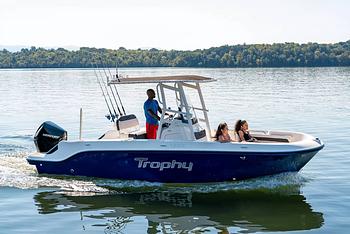
7th Apr 2024
Best Cheap Fishing Boat Brands, Affordable to Cheapest of All

30th Mar 2024
Best Boat Navigation Apps for Smartphones
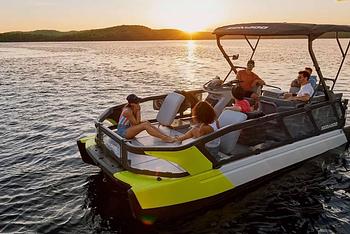
29th Mar 2024
Best Jet Boat Brands Among All Types of Small Craft

26th Mar 2024
Best Sport Fishing Boats, Convertible and Express to Center Console
- Explore Rightboat
- Boats for Sale
- Boating Articles
- Buyers Guide
- About RightBoat
- Sell Your Boat
- Boat Selling Advice
Enter your email to keep up to date with the latest news
Join for free
Sign up now for free and discover how easy it is to keep up to date with THE latest boats for sale. Find your right boat, and tailor your voyage to finding your next boat.
Benefits of becoming a member:
- Set up tailored alerts
- Personalise your experience
- Download full specifications and broker details
- Keep tabs on your favourite boats
Are you a broker? Join as a Broker
Rightboat - join for free.
Do you have an account already? Login
Save this search
Save your search and receive new boats in your email..
You can unsubscribe from your alerts whenever you like. By pressing the button you accept the Legal Terms and conditions
PONTOON BOATS VS. DECK BOATS

If you’re looking to invest in a new boat, there are several factors to consider. Many people narrow their options to choosing between a pontoon boat and a deck boat. Which is right for you? Obviously, it depends on what you’re looking for in a boat.
Consider these factors:
In general, a deck boat will be more expensive than a pontoon boat. However, more luxurious pontoon models will begin to approach price point similar to that of a deck boat. And, depending on what type of engine you choose for either, that alone could cost up to 50% of the price of the boat itself. Obviously, prices vary among both styles of boats, but in most cases, a deck boat will cost more.
Size and Space
The actual size can be quite similar from a deck boat to a pontoon boat, so if this is your deciding factor, consider the purpose of your boat. Deck boats can usually accommodate up to 12 people, but the more-spacious layout of a pontoon boat can comfortably and safely fit up to 16 people on large models. Pontoon boats have always been known as one of the best values on the water because of their ability to hold so many people at such an attractive price point.
With deck boats able to entertain up to a dozen people as well, you’ll want to consider what type of space you’re seeking. Most deck boats have all seating facing forward, which is especially nice when cruising at a high speed, whereas pontoons have the flexibility to face any direction, even re-arranging furniture while entertaining friends or family on the lake.
Both types of boat will have a fair amount of storage space, but generally speaking, a pontoon boat will have more.
Hull, Stability, and Ride
The decks of most pontoon boats lay flat across the two pontoons (also known as a multi-hull design), which makes them ideal for socializing. The flat hull keeps the boat steady in the water, both while moving and sitting still.
Deck boats, however, use v-hulls, which cut through the water while moving, allowing deck boats to accelerate more quickly than traditional pontoons. A pontoon boat trying to reach the same speed as a deck boat will require more fuel to do so; however, pontoons are much more fuel-efficient overall.
The downside of the fiberglass v-hull comes from its central axis, which leads the boat to rock with wind, waves, or movement of the passengers on the boat.
You no longer have to choose one or the other, though. Manitou’s V-Toon Technology, available on many of our models, mimics a traditional v-hull in shape while maintaining the stability of traditional pontoons.
Generally speaking, because of the different types of hulls, deck boats are better for slicing through the water, but pontoon boats keep you steady, whether you’re in motion or not.
With the recent increases in power on pontoon boats (again, depending on the type of engine you select), the disparities between what you can do on a deck boat as compared to a pontoon boat are shrinking, especially when you consider V-Toon performance.
For instance, a pontoon with a 150-horsepower engine is plenty for tubing or water skiing; however, it’s worth noting that if you’re an experienced tuber or skier, you may not catch as much air as you’d like. Deck boats are still superior in that respect, as they slice through the water and give you some wake to navigate.
If your water sport of choice is fishing, a pontoon boat is the way to go. Not that you can’t fish from a deck boat, but the stable platform and additional room on a pontoon boat will definitely be to your advantage as you try to reel in tonight’s dinner.
Maintenance
As with any watercraft, it’s essential to keep your boat clean and in working order. This requires effort on both deck and pontoon boats, but the difference here is most noticeable on the hulls. The aluminum pontoons are far easier to clean and maintain than the fiberglass hull of a deck boat, which needs to be wiped down after every day spent on the water. If you don’t wipe the gelcoat meticulously, water spots become ridiculously difficult to remove later.
Which is Right for You?
Pontoon boats remain the best value on the water and continue to advance, both in style and power, without losing the essential wide-open spaces perfect for entertaining and socializing. Deck boats give you a little less space for socializing, but in many cases will move you through the water faster, even if you have to sacrifice a little stability and keep up a meticulous maintenance regimen. And if you find yourself wanting the best of both worlds, explore Manitou’s performance pontoons.
YOU MAY ALSO LIKE
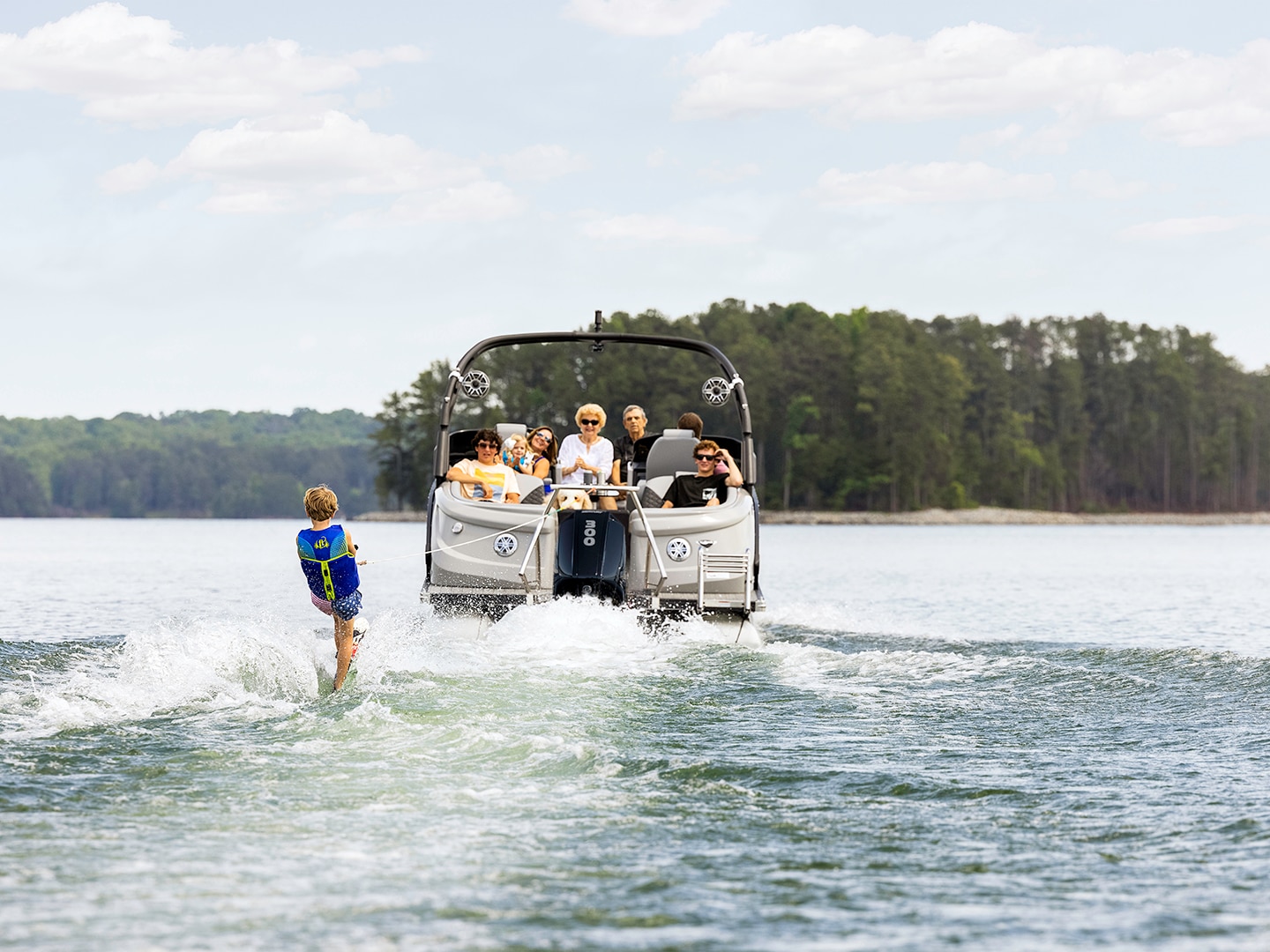
CAN A PONTOON BOAT PULL A SKIER?
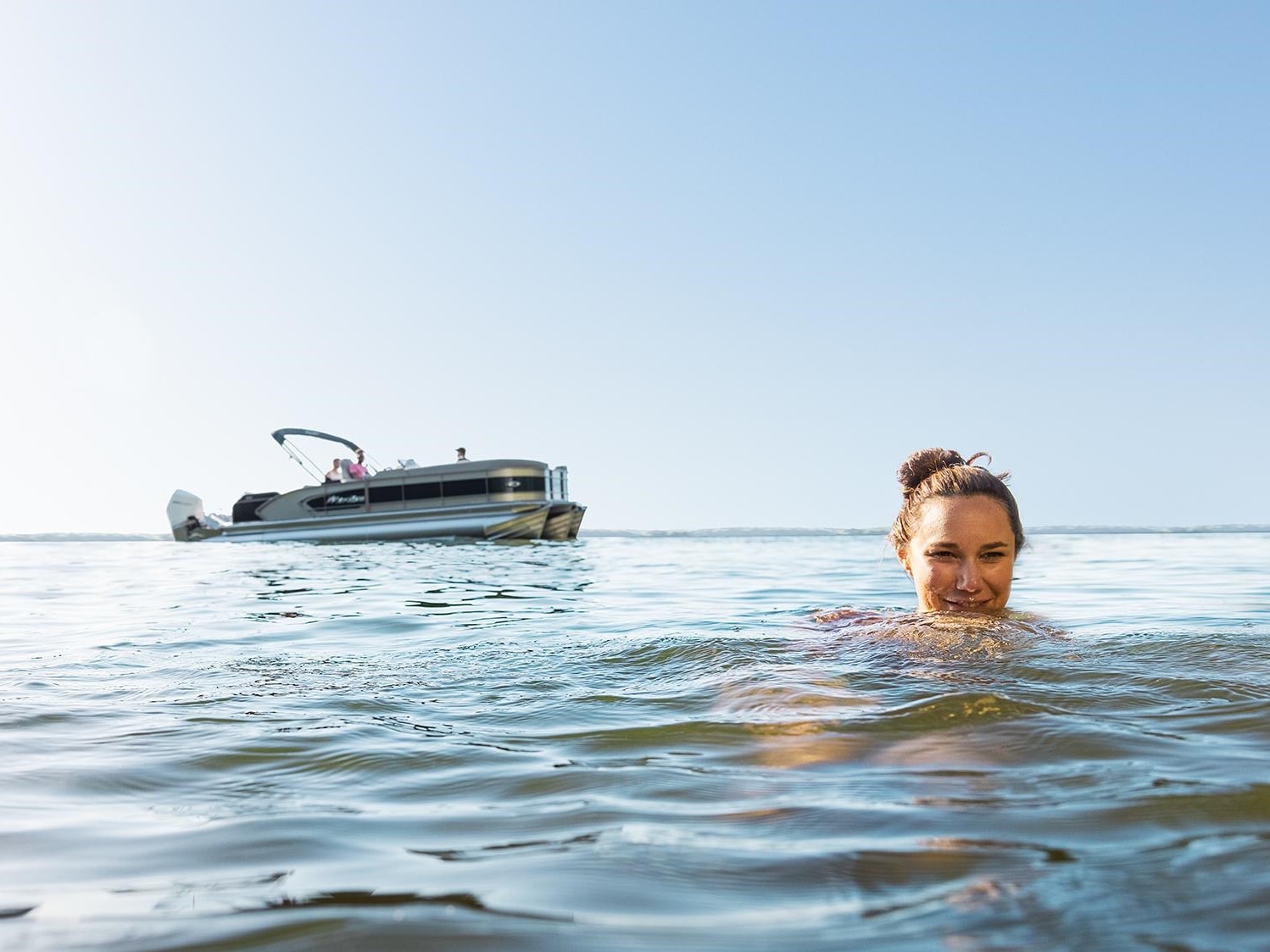

Can You Take A Pontoon Boat Out in the Ocean?
Pontoon Boat vs Catamaran: What’s the Difference?
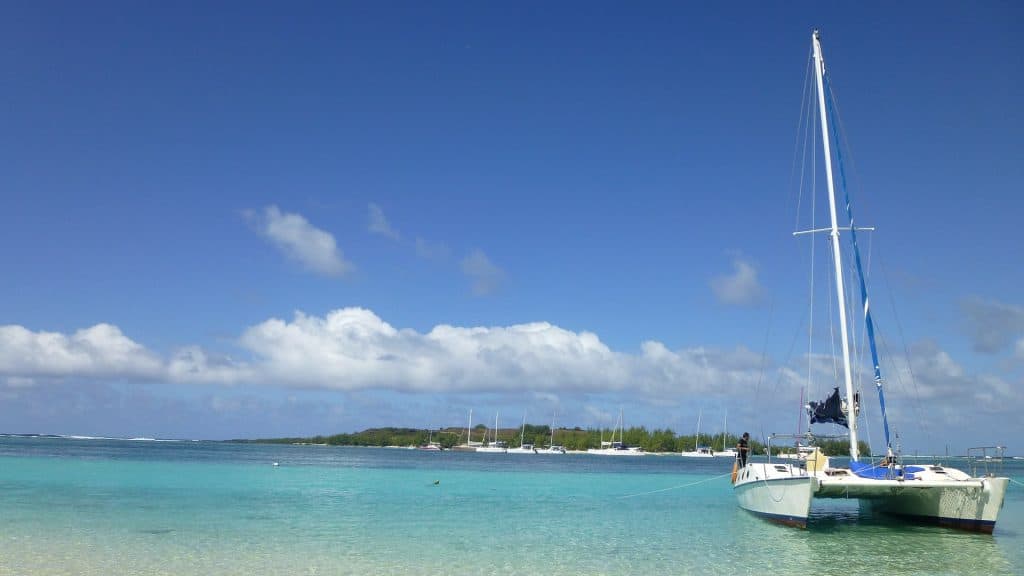
There are many types of boats. Despite sharing many similarities, some boats are better than others for a specific use, and after scouring every source of information, maybe you still can’t find the right guide regarding the topic of a pontoon boat vs catamaran.
Well, say no more, because this is the one you’re looking for.
We’ll take a look at which is which and what the better choice is for a potential buyer. So let’s get down to the basics first.
What makes a pontoon boat a pontoon boat, and what makes a catamaran a catamaran.
Pontoon Boat
A pontoon boat is a type of boat focused on recreation. It's easily identifiable by its unique hull structure, and large deck area. The boat itself does not float on water but rather sits on top of a set of floatation devices called pontoons hence its name.
These pontoons are filled with air inside and are air-tight like a balloon. Also they are practically unsinkable due to their design and they work amazingly well even when in shallow waters .
The pontoons themselves have high carrying capacity and give a sense of security to the owner knowing that he/she can carry a lot of passengers and gear. For reference, military-grade pontoons can even carry fully loaded armored tanks, so yeah pontoons are amazing.
Pontoon boat manufacturers just add a deck , a roof, and other amenities and accessories on top of these pontoons. Think of a living room stacked on top of a set of hotdog-shaped lifebuoys, add an engine to that and that’s pretty much what a pontoon is.
A catamaran is a type of boat that is also easily identifiable due to its unusual hull design. Unlike a common yacht or fishing boat that has a v-shaped hull, a catamaran takes this one step further by having two v-shaped hulls, one on either side and connected by a bridge deck.
This has several benefits including increased stability, a larger deck space, can be used on shallower water, and has better fuel efficiency since less of the boat is in contact with the water.
Imagine two boats side to side, with a living room connecting both of them, and that’s pretty much what a catamaran is.
Pontoons vs Catamarans

Both have unique hull designs, both are stable and both have massive deck sizes. So they’re practically the same boat right?
Well, no. Despite being similar in many aspects, they are designed with different purposes in mind, and thus are better in their respective roles.
But before we head down to what makes a pontoon boat better than a catamaran or vice versa, let’s focus on the differences between them in each criterion the average boater should have knowledge of.
Pontoon boats are great for relaxation and cruising. They have a wide-open deck that is well suited for these types of activities. If you love feeling the wind in your face as you move through the water at a relaxing pace, then a pontoon boat is perfect for you.
Catamarans are designed with sailing and open water cruising and thus have a more luxurious indoor setup, but also have a high visibility upper viewing deck for sightseeing. If you’d like to bring an entire house with all the amenities on those marine adventures, catamarans are one of the best options for this.
Hulls and Deck Access
Earlier we’ve introduced that pontoon boats do not have a hull of their own but rather a set of pontoons, commonly two of them with a special case being tritoons which as the name suggests have three pontoons keeping the deck afloat.
Pontoon boats have a high amount of buoyancy due to their design and are capable of shallow water travel, high carrying capacity, due to the increased surface area in contact with the water.
The moment you step onto a pontoon boat, you’re already on the deck. As these boats are known for their wide-open and flat deck, climbing on top of one is easy enough as the deck itself is just a few inches above the waterline. Pontoon boats also have multiple access points which are easy enough to maneuver through.
A catamaran, on the other hand, uses the standard v-shaped hull but has two of them side by side and is connected in the middle by the bridge deck. Using a v-shaped hull means that a catamaran can travel at speed, and since it has two of them, the increased buoyancy allows it to travel on shallow waters and have reduced hydrodynamic friction leading to more speed, stability, and a better fuel economy.
Deck access on a catamaran is a bit more difficult compared to that of a pontoon, as it requires you to use a series of steps and ladders to reach the upper deck because it lies a few feet above the waterline in stark contrast to the few inches a pontoon decks height rests at.
Catamarans have rooms and thus larger doors which may be uncomfortable to fit through for some, but it does have luxury and security in mind and has a limited amount of access points compared to a pontoon boat.
Pontoon boats are recreational by design, and thus they are of a smaller size. They lie somewhere around 15-50 feet, which is plenty of room for whatever short-term activity you have in store for it.
Catamarans in comparison to pontoon boats have massive berths because they are designed for luxury cruising and can handle a wider variety of weather conditions. You can’t take a pontoon boat out on the open water, but a catamaran can handle both open and shallow water. These vessels range from around 40 to even 145 feet in length.
Intended Use
Pontoon boats are great for short-term social gatherings, fishing , and watersports like skiing and tubing . They are intended to be used as recreational vessels and they are absolutely outstanding in that regard.
Catamarans are meant for travel while being at the highest tier of the luxury and performance side of things. Thus if you’d like to have everything on your boat, because you travel from one place to another, yet want to maintain comfort, speed and then some, then catamarans are for you.
Propulsion is the method by which a boat moves forward, thus we’re going to be comparing the catamaran and the pontoon boat in this aspect. But before that, we need to understand that the catamaran and pontoon boat are designed differently and there will be a clear winner in each category.
Catamarans are mostly powered by sails. High-end catamaran boats do have engines, but they use these sparingly and only in emergencies. Being powered by sails, engine noise is not an issue for catamarans.
Pontoons, on the other hand, can be mounted with multiple engines of varying horsepowers, and a solar-powered version can even come with an electric engine if you prefer a more silent ride.
Sails rely on wind and can be powerful when used correctly, unfortunately, there will be some use cases where there are no winds, and using the catamaran’s engine just doesn’t cut it. That said for long-distance travel out in the open water, nothing beats the efficiency of being able to move your boat for free.
As pontoons have their own dedicated engines, power is constant and can be delivered on cue. If you want power at any given time rather than over a period of time, pontoons have this in the bag.
Pontoons can travel at around 15-25 miles an hour, which is more than enough speed for your average watersports enthusiast and can cruise slow enough for more relaxing boating trips. For more details see our guide: Pontoon Boat Speeds
Catamarans can travel around 11-17 miles an hour and are roughly a third faster than their monohull counterparts. As previously discussed, catamarans rely on the wind thus their speed varies greatly, however for long-distance trips over a comparably long span of time where high speed isn’t really a necessity, catamarans win easily.
Capabilities
Pontoons can carry a relatively sizeable number of passengers during a single trip and are capable of pulling inflatables or nets when needed as pontoons tend to be quite powerful despite their compact size.
Catamarans can do almost everything that a pontoon can do and more. It has viewing decks, living quarters, bathrooms, and a fully functioning kitchen. However, it isn’t entirely perfect since it can’t produce power on cue due to its reliance on wind power, thus although it can be used for watersports, it can be very unstable in that respect.
Catamarans generally are the more expensive type of boat, as they are practically floating hotels, with a living room, sleeping quarters, bathrooms, and a fully furnished kitchen. They cost roughly around a few tens of thousands to a few million dollars depending on the size, capabilities, and luxuries included.
Do take into account the fact that a catamaran is basically a floating hotel, and by comparing the cost of staying in different luxurious hotels over a long period of time vs the cost of owning and maintaining a catamaran, the catamaran is a more practical choice.
The most expensive pontoons out there can rival the lower tier catamarans in terms of price, but do take this comparison with a grain of salt as this is an apple to oranges kind of thing.
Pontoons do come with a lower price, but they are focused purely on the recreational types of activities and are severely limited compared to the versatility of a catamaran.
Maintenance
A pontoon boat requires regular hull and deck cleaning as well as engine maintenance. Interior and hull detailing is required for salt, or wax buildup as well as regular upkeep of the upholstery. The upholstery on a pontoon boat can be a big problem when not properly maintained as they are constantly exposed to the elements thus a good pontoon boat cover when not using the boat is advised.
A catamaran is designed to face the weather 24/7 and has no engine for the most part thus requires significantly less maintenance compared to a pontoon. The interior is affected less by the weather and more by passenger use, but it still needs to be checked every now and then. Do expect an estimate of around 10% of the catamaran’s price for the cost of maintenance each year.
Resale Value
For catamarans expect a depreciation rate of around 5% on average every year, and maybe more if the boat is not properly taken care of. Some catamarans that are built and ordered abroad will have their resale value affected by currency fluctuations, so if you’re lucky enough you could sell it for the price you bought it, after currency conversions.
As for pontoons, the depreciation rate is somewhere around 8-9% per year over the course of a 10 year period, but this rate can drop down to 4% per year for the largest of pontoons. Pontoon boats are easier to acquire thus you will always sell them for a loss. We have written extensively on pontoon boat depreciation so check that guide out for more details.
What a Catamaran is Best For
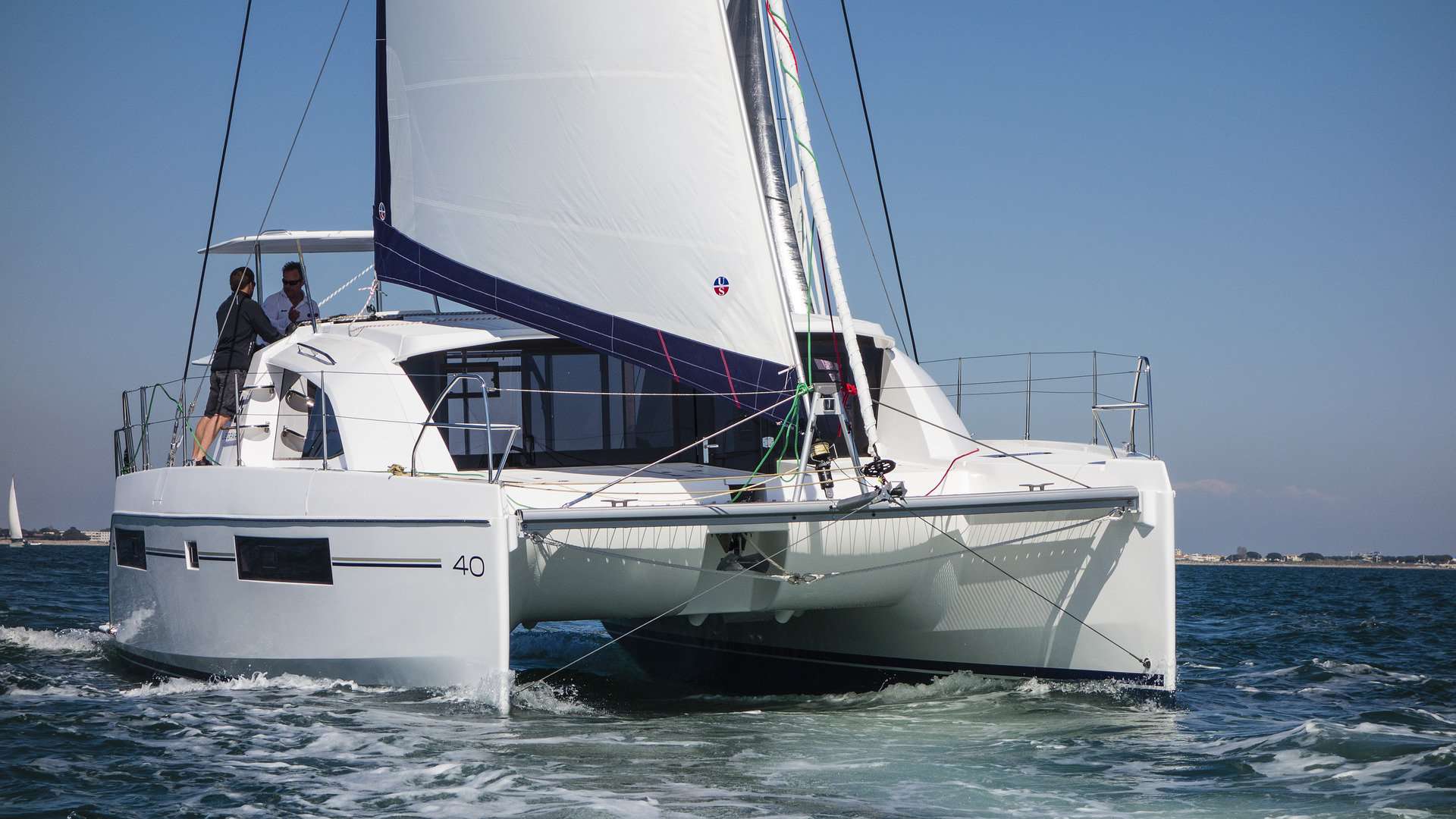
The experienced boater. For those who are skilled and capable and want to go on marine voyages for extended periods of time. That said even though the passenger numbers are limited it can go further and through a variety of weather conditions, in complete luxury and safety.
- Long voyages
- Open water and shallow water cruising
- Luxury accommodations
- Living spaces
- Not reliant on fuel
- Cannot have power on demand
What a Pontoon is Best For
The weekend warrior. Pontoon boats work best during day trips and through a plethora of water-based activities and can be versatile due to their simplistic design. The capability of bringing a relatively large number of passengers and equipment for its size, make it an ideal workboat for transport if that be the case.
- Short trips
- Water sports
- Social gatherings
- Power on demand
- More affordable
- Shallow water cruising only
- Passengers exposed to the elements
- The deck is the only utilizable space
In summary, pontoon boats are focused on short-term recreational trips and are generally cheaper in cost and maintenance. Catamarans on the other hand are luxurious and designed for longer trips out on the open water, accompanying these capabilities are equally more expensive price and cost of upkeep.
Given that it is necessary that in order to make an informed decision, one must consider each factor regarding what use case scenario the boat will be involved in so you yourself won’t have any problems when on the topic of a pontoon boat vs catamaran.
Related Posts

Where to Ground an Amp on a Pontoon Boat

Boating with a Baby or Toddler: Rules, How to & Safety Tips

12 Advantages of a Pontoon Boat: The Benefits & Drawbacks

Boating with Dogs: A Complete Guide for Safety & Fun


- Oct 13, 2021
The Pros and Cons of Pontoon Boats
By: Bill Jennings

This is the second in our series designed to help you choose the boat type that will work best for you. When a person buys a boat today, he or she must first decide the "type' of boat that most interests them. With the advances in design and types of boats now available, this can be tricky and buyers can inadvertently choose a boat that may not suit their needs. The more a boat is designed to fit into a specific "type" category, the less efficiently it will work in a different category. This week we take a close look at pontoon boats . The information provided, won't compare different manufacturers, or make specific recommendations, but rather give you an idea what to expect from a pontoon to make it easier for you to decide if a pontoon boat is right for you.
Pontoon boats were originally little more than a raft with supporting logs. In fact, what we now call aluminum tubes, were once called "logs." But as more powerful outboard motors became available, it became possible to build a pontoon with comparable speeds to a standard runabout. When manufactures added a few external changes to the tubes to improve lift, a whole new category of boats quickly evolved.
Every boat is a compromise and pontoons are no exception. While they do have some unique benefits, there are also some inherent drawbacks. The most quoted drawback of a pontoon is the slow speeds achievable by the average model when compared to V-hull boats of the same length. Attracted by the practical side of pontoons, many buyers purchase pontoons with a low horsepower outboard, which of course limits how far and how quickly the owner can travel in a day's cruise. So, lets first look at pontoon speed.
Referring to the many boat tests conducted by BoatBlurb, a 90 HP outboard on a 24' pontoon will generally run 18 mph top speed. With a 115 HP OB the toon should produce a top speed of about 24 mph. Move up to a 300 HP OB and your top speed will jump to 50 mph, but you will be moving in the wrong direction for economical boating. In my opinion, a buyer today looking to use a pontoon on a regular basis should order it with at least a 115 HP outboard.
While 115 HP is my minimum recommendation, there are some good reasons to consider even more horsepower. You should never buy a boat slower than the last one you owned. Your body's senses will quickly create dissatisfaction. Also, you don't want to buy a boat that you end up running at full throttle most of the time. Finally, you will never hear a boater complain that their boat has too much horsepower. Therefore, for all around pontooning, a 175 or 200 HP motor is best suited to keep you (and your partner) happy.
In addition to more horses, there are other factors that will improve pontoon speed. A third tube down the pontoon's centerline, creates a "tri-toon". This 3rd tube will add some drag, but most of that is offset by the increased flotation and ride improvements that it provides. The center tube, when set slightly lower than the outside tubes, changes cornering lean from the outside of your turn, to the inside of your turn. This "feels" more natural, improves stability, and gives the toon a higher horsepower rating.
The most important part of a pontoon boat is, no surprise, its pontoons. Almost all pontoon boats ride on floats made of aluminum. Aluminum is a ductile metal that is both corrosion resistant and very tough. Painting is optional since a corrosion-resistant film of aluminum oxide forms on the untreated surface. At 170 lbs per cubic foot, it is about one third the weight of steel. Its ductility allows pontoon tubes to deform and stretch nearly twenty-five percent before rupturing from impacts. It is also more abrasion resistant than either wood or fiberglass.
The standard thicknesses for pontoon 'sheet' aluminum tubes is .080 to .130 inch. Tube diameters on popular models are either 25 or 27 inch. The grade of the aluminum to look for is either 5052 or 5086 grade. The larger numbers being preferable for the above three cases. For best performance, aluminum lifting strakes and spray aluminum rails are welded to the tubes.
From my experience driving plenty of pontoons, I would make the following subjective ratings for this type of boat.
Life Expectancy : Good. 10 to 20 years. This is provided you cover the upholstery to protect it from the sun, as well as cleaning the aluminum tubes at least once a year.
Storage Space : Average. Most pontoon lounges have storage under the seats, but the sizes vary and most do not lock. Other boat types have sufficient storage available, to exceed what is called for in that particular 'type' of boat.
Ride Comfort: Excellent. While some manufacturers buy pre-fabricated lounge seats, most build them in-house with special pride in their comfort levels. When running through medium chop, the tubes deliver a 'catamaran-like' ride that toon owners appreciate.
Handling : Better than average. Tracking at average speeds is excellent, but when docking, wind can have a negative effect because of the high freeboard. As we know, boats don't have brakes, so a sharp turn is the best defense. Turns are wider with a toon, reducing brake efforts while also increasing the turning radius needed in marinas. Nonetheless, the controls are simple and toons are easy to drive.
Ride Safety : Mixed. While the "fencing" surrounding a pontoon makes them safe for kids, toons are not designed to handle rough water. Unlike a typical V-hull, the pontoon is not designed to maneuver in strong waves. Once you become familiar with the wave limits for your pontoon, you can select boating days where weather is not a concern. Almost all scary moments in a pontoon occur if you drive the boat offshore or through big water. Often the scare is simply stuffing water down the decks and soaking passenger's shoes. On occasion, rough water can shake and vibrate the tubes and that sound will also shake passenger confidence. For these reasons, pontoons are classed as inland water vessels. All this makes weather checks an important part of pontoon cruising.
Capacity : Excellent. Many toons are sold on the vision of taking all of the neighbourhood kids for a ride. If passenger numbers are key for you, look to a toon to provide the answer. Only comfortable seats are counted on the capacity plate, unlike some boats where small children's seats are counted as passenger seats.
Cost : Varies. Like other boat types, you get what you pay for with pontoons. A basic toon with a small outboard will get you on the water for under $20,000. A high end toon designed to show your neighbours who's boss and provide you with cruiser amenities, can cost north of $200,000.
Maintenance Required: Minimal. Thanks to the durability of available aluminum tubes and using outboard motors for power, pontoon boats are a superb choice when it comes to low maintenance. Just be sure to clean and cover that upholstery.
Buying A Pontoon:
If you are buying a new pontoon, look for the aluminum tube specifications I described in the paragraph on aluminum tubes, including aluminum lifting strakes. As for options, be sure to order a full canvas cover, a lift curtain to house a port-a-potti, and a Bimini top.
If you are looking for a used pontoon, check the aluminum tubes for any damage, signs of welding, cracks, or patches. Check the underside of the boat to be sure the laminate is smooth and not cracked or bubbled. Sit in every seat to check that the foam is firm and look for any tears or cracks in the marine vinyl seat covers. Of course, make you offer subject to a sea trial and further inspection.
Bottom Line : As a boat 'type,' pontoons are currently very popular. There is good reason for this. The majority of people boat on small inland lakes and rivers, and on these waters the pontoon class of boats provide a pleasant boating experience at an affordable cost. There is a reason for their growing popularity.
#tips #boattypes #pontoon #pontoonboats
Recent Posts
What is AIS and How Does it Work?
Boating Trends for 2024
Crystal Ball 2024 - What Will Your Next Boat Look Like?
I've always been curious about the reason they make pontoons round instead of taller and narrower? It would seem to me that it would reduce drag, but I don't know much about boat other that ships can carry a boat but boats can't carry ships.

- Dec 7, 2023
Yamaha to Reveal Hydrogen-Powered Outboard Prototype at Miami

- Nov 3, 2023
FLIBS Recap- 7 Boats You Gotta See in 2024

- Nov 1, 2023
First Drive – Brunswick's Autonomous Docking System

- Oct 25, 2023
Why the Vertical Bow is Making a Comeback

- Oct 6, 2023
Formula Announces Massive 457 Center Console Models for 2024

- Sep 27, 2023
This Is It - The Coolest Catamaran Ever Built

- Sep 13, 2023
#WeirdBoats - Historic 'Flying Boat' that Led Amazon Expedition is Up For Sale

« View All Posts
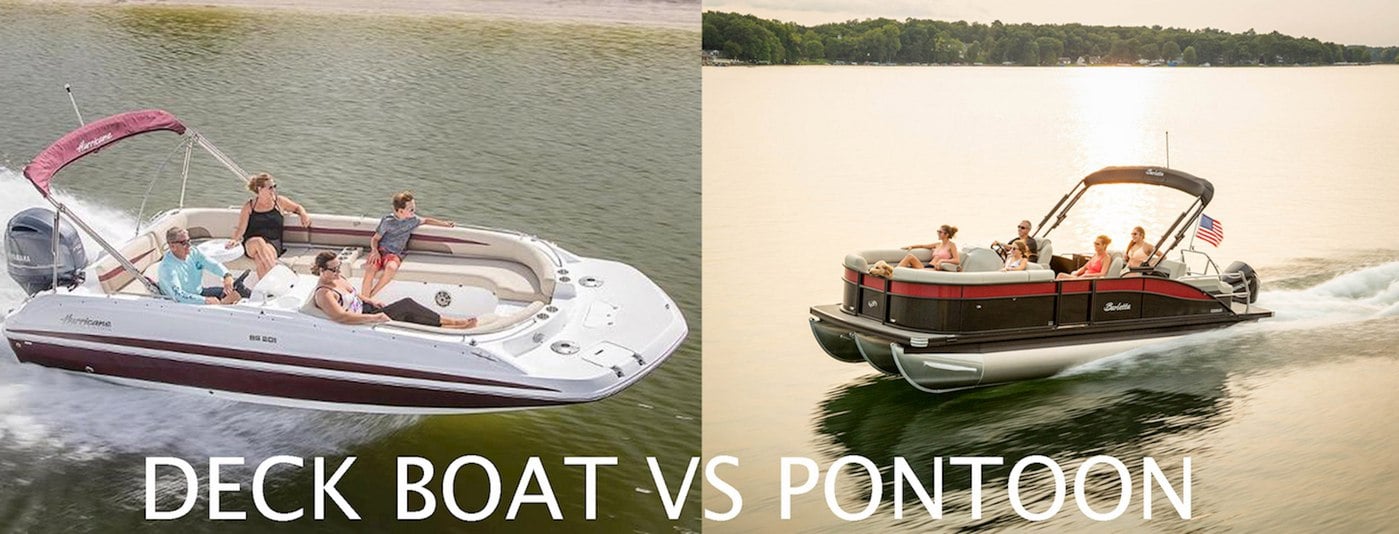
By: Ashley Lizzi on January 28th, 2021
Print/Save as PDF
Pontoon Boats vs Deck Boats. Which One is Right for You?
If you’re shopping for a new boat, you’ve probably already figured out that there are a plethora of choices. Where do you start? Do you know what your perfect day on the water already entails?
Are you looking for a vessel that will have enough space for the whole family including Fido? Is a smooth ride important or are you ready to take on the chop of big water? There are a couple of boats that will cover all those bases and more.
As you begin to narrow down your choices you may be contemplating two different types of boats. You may be wondering, what’s the difference between a pontoon boat and a deck boat?
Pontoon boats and deck boats have evolved over time to be more modern and sleeker than ever. Both offer a lot of similar qualities, but there are a few stand out differences that may make or break your buying decision.
As a long time pontoon boat owner and team member of Barletta Boats, I’ve got insight into what’s trending in the boating industry and what you can expect from newer products. Here are my thoughts on pontoon boats vs deck boats.
Important to Know
Deck boats were popular years back when they were the solution to having a speed boat that could fit a large group of people. This type of boat had the qualities of both a fiberglass bowrider and a pontoon boat.
People gravitated towards deck boats because they hold a lot of people, have high horsepower engines, and you can use them for different watersports. They were considered the best of all worlds.
In today’s market, deck boats have lost some of their shine due to the innovation of pontoon boats. What you wanted from a deck boat in the old days is now overshadowed by the features found in the pontoon boats of today.
Not only are deck boat brands becoming sparse, but the evidence shows that pontoons are trending far more. You will find more pontoon brands exist now than ever before, and the number of deck boat brands continue to decline. Check out the evidence in this trend graph that compares both searched terms on Google.
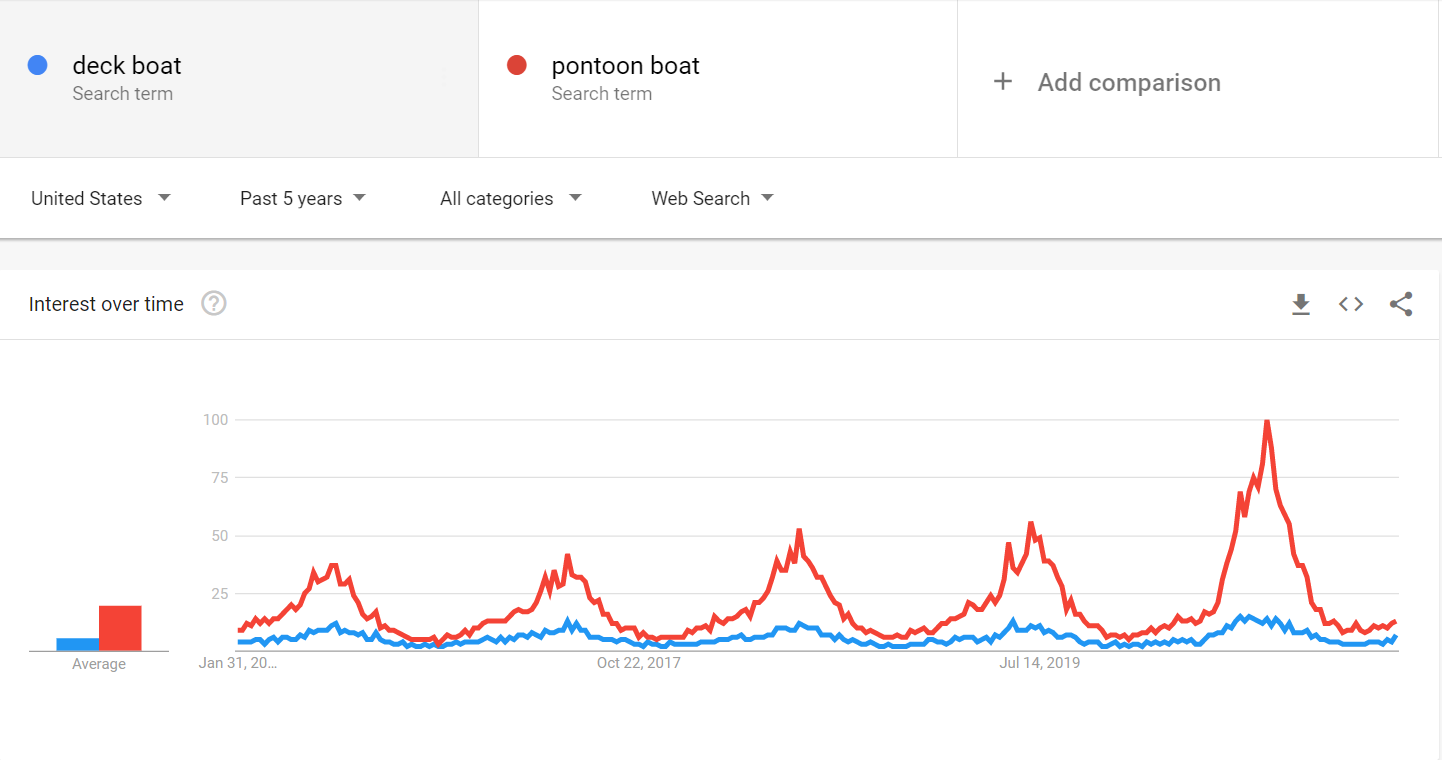
That being said, let’s take a look at what makes these two boats different. This should give you an idea of where you stand with deck boats and pontoon boats.
Comparable Features Between Pontoons and Deck Boats
Styling is one of the standout differences between pontoon boats and deck boats. When it comes to styling, the choice comes down to your preference.
Do you prefer a fiberglass hull or aluminum toons? Deck boats have a fiberglass V hull body style whereas pontoon boats sit on aluminum toons high up out of the water.
This feature drove a lot of the popularity for deck boats specifically in intercoastal areas. Fiberglass holds up well in saltwater whereas the pontoons of yesterday were not suited for this type of exposure.
Pontoon boats today, however, are built with saltwater users in mind. Many manufacturers offer saltwater safe packages or models that are made specifically with saltwater friendly components.
Although deck boats emulate a speed boat or run-about, pontoons have become sleeker and more eye appealing as they have evolved.
The styling of each boat mostly comes down to your preference. You have to ask yourself which type is more eye appealing.
As I had mentioned, deck boats are able to hold a large group of people at one time. Pontoon boats have always shared that quality and actually offer a little more space due to their construction.
The V hull shape of a deck boat offers plentiful seating, but not much walk-around space. The way a pontoon is constructed, the platform-like structure offers plenty of walk-around space throughout the entire boat.
With the amount of seating between both boats, each offers lots of storage under the seats. In-floor ski lockers can be found on both, but pontoons have introduced a new type of in-floor storage.
Newer tri toons offer storage in the center toon. The location of this ski locker offers a large amount of space and can fit long objects such as sand anchors or auger-style anchors.
In all, you get a great amount of seating and storage with both boats. Pontoons will offer more usable surface area that equates to walk-around space as well as seating for all.
The engine is another component that differentiates these two types of boats. Of course, you have a plethora of horsepower options for both, but let’s talk about what type of engine you will get.
Nearly all pontoon boats on the market today only offer outboard engines . These can range anywhere from approximately 25 horsepower all the way up to 450 horsepower.
With the limitation on the type of engine a pontoon can facilitate, this does hinder some watersports such as wake surfing. There is also a limit on horsepower depending on the length of the pontoon.
Deck boats, on the other hand, offer two engine options. These options are outboard and I/O or, inboard/outboard. Unlike pontoons, smaller deck boats can facilitate larger engines.
Depending on your preference and how you choose to use the boat, you may prefer one over the other.
The construction and design of a boat dictate what kind of ride you will experience. Other factors such as length, engine size, and steering options also play a part. With all of that in mind, pontoon boats and deck boats do differ slightly in the type of ride they offer.
Pontoon boats plane out quickly because they’re already sitting on top of the water. The toons, wave tamers, and nosecones take the brunt of the chop and act much like shocks in a car leaving you with a smooth ride.
Deck boats plane out quickly as well due to their V-Hull style bow and flat stern hull. However, this type of structure does not cut through chop as well, which creates a bumpier ride than pontoon boats. Additionally, deck boats tend to "wander" a bit more at lower speeds, making steering the boat a little more difficult.
Sitting higher off the water in a pontoon boat also helps with spray. You are less likely to get wet in a pontoon than you are low to the water in a deck boat.
Because both boat types offer ample seating, they are similar in the sense that large group outings are more than possible. But what can you expect to do with either boat?
Pontoon boats have evolved into a one size fits all type of vessel . Almost every manufacturer offers a plethora of multifunctional floorplans. There’s a layout for any type of boater.
Do you want a bar onboard? You got it. Do you want an arch to ski from? Pontoons have you covered. Do you want fishing chairs and a livewell? Pontoons, pontoons, pontoons.
Deck boats have some similar qualities such as lounge-type seating and watersport friendly features. You can host a large group or family but you will be lacking walk-around space.
Keep in mind, deck boats are limited to the traditional bow and stern cockpits that all fiberglass boats tend to have. Because fiberglass boats are expensive to make, maintain, and store, you won’t see a high number of diverse floorplans.
Although both boats offer similar functions, pontoon boats do offer more multifunctional floorplans. That said, you will be able to do more with one type of pontoon boat than you would a deck boat.
How To Choose
It’s safe to say that deck boats paved the way for the comfortable, functional, gather-friendly boat experience. As pontoon boats have evolved, they have taken the lead in functionality and likeability.
There are a lot of comparable features that will come down to your preference when choosing between the two. Test driving both types will also give you a good idea of what you like best.
If you’re considering a pontoon, you may want to know the pros and cons of owning this type of boat, in that case, we’ve got you covered. If you’re considering a deck boat, you might want to look for different brands that are still being built today as they are becoming more limited.
A great place to start is by finding a dealer near you and walking through both boat types. You will get a good idea of the features offered, price points, and engine options.
.png?width=700&name=BUILD%20(2).png)
About Ashley Lizzi
Barletta Content Manager, 9+ years Manufacturer Marketing, Brand Management, Customer Experience, and life-long boater.

- Boat Anchor For Lakes
- Boat Deck Chairs
- Jet Ski Life Jacket
- Towable Tubes
- Arrows for Compound Bow
- Beginner Compound Bows
- Bowfishing Bow
- Broadheads For Hunting
- Crossbow Pistol
- Fastest Compound Bows
- 4 Person Tent
- 12 Person Tents
- Tunnel Tents
- Camping Cooler
- Hot Tub Steps
- Portable Shower
- Pop Up Canopy
- Crappie Rods
- Fly Fishing Vest
- Hooks For Catfishing
- Kids Fishing Poles
- Monofilament Line
- Smallmouth Bass Lures
- Trout Fishing Baits
- Walleye Fishing Lures
- For Big Guys
- Roof Racks for Kayaks
- Tandem Fishing Kayaks
- Trolling Motor Batteries
- Deer Hunting Rifle
- Duck Hunting Gun
- Gamo Silent Cat Air Rifle
- Shotgun For Dove Hunting
- Turkey Shotgun
- Dehumidifier
- Door Organizers
- Concealed Carry Belt
- Concealed Carry Vest
- Small Of Back
- Gun Cleaning Kit
- Rifle Bipod
- Range Finder For Long Range Shooting
- Reloading Kits
- Shooting Ear Protection
- Shooting Glasses
- Shooting Gloves
- Shooting Chronograph
- Eotech 512 Holographic Sight Reviewed
- Laser Bore Sights
- M&P Shield Night Sights
- Pistol Red Dot Sight
- Predator Hunting Lights
- Red Dot Sight
- Shotgun Lights
- Spotting Scope
- 1911 Magazines
- .17 HMR vs .22
- 30-30 vs 308
- .45-70 versus .308 Ammo
- 3 MOA vs 6 MOA
- Best Ducks for Eating
- Bugout vs Griptilian
- Camping on the beach tips
- Can you Shoot Guns While Pregnant
- Carbine vs Rifle
- Carbon Arrows Vs Aluminum
- Caribou vs Moose
- Compound Bow vs. Crossbow
- Concealed Carry Guide
- Drop Point vs Clip Point
- Alaska Fishing
- Are Muskie Good to Eat
- Baitcaster vs Spinning Reel
- Bass Fishing California
- Bass Fishing Georgia
- Bass Fishing in Idaho
- Bass Fishing Louisiana
- Bass Fishing in Tennessee
Bass vs Trout
- Biggest Bass Ever Caught
- Best Bait for Catfish
- Best Catfish to Eat
- Best Fishing Boat Names
- Best Fishing Songs
- Biggest Trout Ever Caught
- Cane Pole Fishing
- Casting Reels vs Spinning Reels
- Chatterbaits without Skirts
- Crappie Fishing Alabama
- Crappie Fishing Florida
- Crappie Fishing Michigan
- Crappie Fishing Mississippi
- Crappie Fishing Texas
- How to Catch Crappie
- How to Fish Crappie From a Bank
- Kayak Crappie Fishing Tips
- Do Fish Bite in the Rain
- Flounder vs Halibut
- Hook Size for Trout
- Down Imaging vs Side Imaging Sonar
- Catch Bass on Frog Baits
- Catch a Big Brown Trout
- Catch Garfish
- Catch a Rainbow Trout
- Catch Walleye
- Change A Fishing Reel From Right To Left Handed
- Clean a Spinning Reel
- Clean Trout
- Get Fish Oil Smell Out Of Clothes
- Pickle Northern Pike
- Spool a Spinning Reel
- String a Fishing Pole
- Iowa Ice Fishing
- Jerkbait and Crankbait
- Lake Nockamixon Fishing
- Monofilament Line vs Fluorocarbon
- Pickerel vs Pike
- Sabiki Rigs
- Sailfish vs Marlin
- Species of Fish in Lake Tahoe
- Spotted Bass vs Largemouth
- Standley Lake Fishing
- Strongest Fish
- Trout Species
- Types of Fishing Line
- Types of Fishing Reels
- Types of Sinkers
- Walleye Trolling Speed
- What do Carp Eat
- What Is Fly Fishing
- Guide to AR15s
- Guide to Jet Skis
- Gun Maintenance Guide
- How Does a Boat Speedometer Work
- Aim a Glock
- Build An Emergency Winter Shelter
- Butcher A Rabbit
- Charge a Trolling Motor Battery
- Choose The Right Rangefinder
- Clean a Life Jacket
- Clean Swim Goggles
- Conceal Carry with a Tucked-In Shirt
- Cook Wild Goose
- Cure And Smoke A Venison Roast
- Cut an Arrow
- Cut Foam For Gun Case
- Dispose of Bullets
- Dispose of Knives
- Find Arrowheads
- Fit Hiking Boots
- Get A Hunting License In California
- Get off a Ski Lift
- Heat A Tent Without Electricity
- Hide a Gun Safe in Plain Sight
- Insulate a Tent for Winter Camping
- Keep Moisture Out of a Gun Safe
- Keep RV Pipes From Freezing
- Long Does It Take To Swim A Mile
- Make Deer Jerky
- Make A Leather Gun Holster
- Mount Your Own Deer Antlers
- Move a Gun Safe
- Much Does a Gun Safe Weigh
- Open a Gun Safe Without a Key
- Pack a Backpack for Hiking
- Pack a Tent In a Backpack
- Parts of a Pistol
- Prepare And Cook Venison Tongue
- Remove Gun Rust
- Sharpen a Knife Without a Sharpener
- Sharpen a Machete
- Sharpen a Pocket Knife
- Ship A Firearm
- Shoot a Compound Bow
- Sight In a Compound Bow
- Sight in a Red Dot
- Start a Fire
- String a Compound Bow
- Swim Faster
- Tan a Deer Hide
- Tan a Rabbit Hide
- Teach Kids to Ski
- Teach a Toddler to Swim
- Transport Paddle Boards
- Transport a Firearm by Boat
- Use a Laser Bore Sight
- Use a Slingshot
- Use A Tactical Pen
- Wash Hiking Boots
- Wash Hunting Clothes
- Waterproof a Wound for Swimming
- Wear a Boot Knife
- Winterize a Jet Ski
- Hatchet vs Tomahawk
- How Far can a Bullet Travel
- How Far Can Crossbows Shoot
- Best Hunting Dog Breeds
- How Fast are Bears
- What does Bear Poop Look Like
- Can Felons Bow Hunt
- Types of Hunting Bows
- Can you Eat Raccoon
- Coyote Hunting Kentucky
- How to Skin a Coyote
- Best Barometric Pressure for Deer Hunting
- Best States for Mule Deer Hunting
- Blacktail Deer vs Whitetail Deer
- Deer Gestation Period
- Draw Weight to Kill a Deer
Homemade Deer Attractants
- How to Age a Whitetail Buck
- How to Clean a Deer Skull
- How to Grunt for Deer
- How Long Does Deer Meat Last in the Freezer
- How Long to Hang Deer
- How Much Meat From a Deer
- How Much Wind is Too Much for Deer Hunting
- How Rare is a Piebald Deer
- Hunting deer in California
- Mule Deer vs Whitetail
- When Do Deer Shed Their Antlers
- Where to Shoot a Deer
- Whitetail Deer Guide
- Wisconsin Deer Hunting
- Dove Hunting in California
- Dove Hunting Mexico
- Dove Hunting in Texas
- What to Wear Dove Hunting
- Best States for Duck Hunting
- How to Use a Duck Call
- Hunting Dog Breeds
- Hunting in Florida
- Hunting in Georgia
- Hunting in Kentucky
- Hunting in Louisiana
- Hunting in Michigan
- Hunting in Oklahoma
- Hunting South Carolina
- Hunting South Dakota
- Hunting in Tennessee
- Hunting in Utah
- Hunting in Wisconsin
- What to Wear Duck Hunting
- Frog Gigging
- How to Keep Feet Warm While Hunting
- What to Wear Pheasant Hunting
- Where to Shoot a Rabbit
- Hunting in the Rain
- Turkey Hunting Kentucky
- Turkey Hunting Michigan
- Turkey Hunting Nebraska
- Turkey Hunting Oklahoma
- Turkey Hunting Tennessee
- Turkey Hunting Texas
- Where to Shoot a Turkey
- Where to Shoot a Hog
- Why Do Hunters Wear Orange
- Irish Setter Hunting Boots
- Brands to Avoid
- Hazards around Dams
- How Long to Kayak a Mile
- How Much Does A Kayak Weigh
- How to Mount a Trolling motor on a kayak
- How to Paddle a Kayak
- How to Tie Down a Kayak in a Truck Bed
- How to Use a Kayak Cart
- Most Stable Kayak Hull Design
- Sit on Top vs Sit In Kayaks
- Lever Action Rifle Cartridges
- MOA vs MRAD
- Most Powerful Handgun
- Parts of an Arrow
- Can a Pontoon Boat Sink
- Deck Boat vs Pontoon Boat
- How Much does a Pontoon Boat weigh
- How to Anchor a Pontoon Boat
- How to Winterize a Pontoon Boat
- Tritoon vs Pontoon Boat
- Pump vs Semi-Auto Shotgun
- Reflex vs Red Dot
- Reloading Ammo vs Buying Ammo
- Rimfire vs Centerfire
- Single Bevel Vs. Double Bevel Knives
- Single-Stage vs Two-Stage Triggers
- Spotting Scope vs Binoculars
- Types of Rifle Scope Mounts
- Ultimate Guide to Camping
- Walkie Talkie Lingo
- Walking vs Hiking
- What Does Grain Mean in Ammo
- What do the Numbers on Binoculars Mean
- What is an Air Rifle
- What is the Loudest Gun
- What is a Long Gun
- What is Recoil on a Gun
- Who Invented the Compound Bow
- Beach Blanket
- Beach Carts
- Beach Cooler
- Kids Snorkel Set
- Pop Up Beach Tent
- Underwater Scooter
- Binoculars for Kids
- Compact Binoculars
- Folding Shovel
- GPS For Hiking
- Headlamp For Hunting
- Heated Jacket
- Hiking Shoes For Women
- Personal Locator Beacon
- Solar Charger For Backpacking
- Solar Watches
- Survival Gear
- Survival Lighter
- Upland Hunting Boots
- Walkie Talkies
- Boot Knives
- Skinning Knives
- Tactical Folding Knives
- Military Knee Pads
- Cheap Air Boards
- Pink Paddle Boards
- Ski Helmet with Visor
- Caps for Long Hair
- Gifts For Swimmers
- Snorkel Vest
- Swim Vest For Toddlers
- Swimmers Shampoo
- Brightest Flashlight
- Waterproof Flashlight
- Waterproofing Spray
- Waterproof Duffel Bag
- Waterproof Wallet

Pontoon boats are the quintessential party boats on the water. It doesn’t get much better than a pontoon unless you’re planning on taking a Carnival Cruise or something along those lines.
A deck boat is a potential competition against pontoons, with a combination of traditional boat features and a more spacious deck design. In fact, deck boat designs were an industry reaction to pontoon boats back in the 1970s.
The primary difference is the v-shaped hull design versus the dual or triple tube design, rather than a pure deck boat vs pontoon boat comparison. Both boats are family-friendly designs and popular with that corner of the market.

Deck boats normally feature wrap-around bench seating designs outlining the inner lip of the bow. There are typically two seats in the center of the craft—one behind the wheel and a passenger seat adjacent to it. An open deck design is featured behind the seats with another wrap-around bench seat in the aft section.
Pontoon boats
Pontoon boats are entirely about deck design , with a large platform sitting on top of two tubes (toons) or three in the case of tritoons . Pontoon boats typically feature a more open deck design with more space than deck boats, wrap-around bench seating, and a ton of standing or storage space.
Pontoon boats provide manufacturers with more creative options in terms of seating and luxury designs.
Differences between the two

Pontoons have a lot more storage space as well, with a higher weight capacity than deck boats. Deck boats maneuver better on the water and are capable of going much faster than pontoons.
Speed & horsepower
Pontoon boats have an average speed of between 25 and 30 miles per hour. They have a very shallow draft and lack stability in choppy water. They don’t cut through the water nearly as well as v-shaped hull designs. They are best for calm days on a lake or slow maneuvering on a river.
Deck boats are much faster and more streamlined than pontoons. The average deck boat is capable of reaching 50 to 70 miles per hour. The v-shaped hull slices through the water and provides better stability in rough water. Pontoon boats also lack the horsepower of their deck boat cousins.
Weight & capacity

Pontoon boats have a higher weight capacity as well, thanks to their buoyancy and shallow draft.
The available space on a deck boat is often surprising to some. The seating is generally arranged in such a way that it’s both out of the way and convenient for a lot of people to sit comfortably at once. However, a deck boat’s space can’t compete with a pontoon or tritoon boat.
Both are great for parties, but the available space and design features limit the deck boat when it comes to additional storage options, such as kayaks, extra inner tubes, and wakeboards.

Pontoons plane very well on open, calm water but the v-shaped hull design of a deck boat is much more stable in rougher and calmer waters, slicing through it like a hot knife through butter.
Pontoon boats are just fine for skiing, tubing , and wakeboarding, assuming the model in question has enough horsepower to really get up and going. But the deck boat is much more speedy and versatile for those types of recreational activities, thanks to its speed and maneuverability.
Pontoon boats have a lot more storage space for recreational equipment, such as kayaks, canoes, tubes, wakeboards, etc.
Advantages and disadvantages

Unfortunately, they aren’t quite fast enough for a lights-out good time while tubing or wakeboarding, and they lack stability and comfort on choppy water.
Deck boats have less capacity and space, but there is still plenty to love. Just because eight people are a better fit than twelve doesn’t mean it’s a party pooper. They are speedier on the water, which makes tubing, wakeboarding, and skiing much more fun.
The lack of deck space may turn some away, at least those looking for larger family and friend get-togethers.
Bottom Line
Choosing between a pontoon boat and a deck boat is not an enviable position. Both crafts have a lot to offer the aspiring water partier. Location probably plays a bigger role in making this choice than anything else.
If you live close to a calm lake where pontoons are prevalent, that’s probably the best choice you can make. If you’re looking for something a little more versatile and resilient on choppy waters (albeit with a little less legroom), deck boats are phenomenal choices in their own right.
Visit the OutdoorWorld Reviews homepage for more expert guidance!

Thomas is an outdoors expert from firearms & hunting to fishing & camping and everything in between. A freelance writer of over 5 years, Thomas combines his passion for the great outdoors and writing skills to provide expert information & guides.
Related Posts

Deer Hunting Tips

How to Catch Walleye

Leave a Reply Cancel reply
Your email address will not be published. Required fields are marked *
Save my name, email, and website in this browser for the next time I comment.

- Affiliate Disclosure
- Cookies Policy
- Privacy Policy
© 2019-2023 – Outdoorworld.reviews
- How does a Fish Finder Work
- How to Guides
- Bow Hunting For Beginners
© 2019 -2022 Outdoorworld.reviews - Reliable Outdoor Reviews
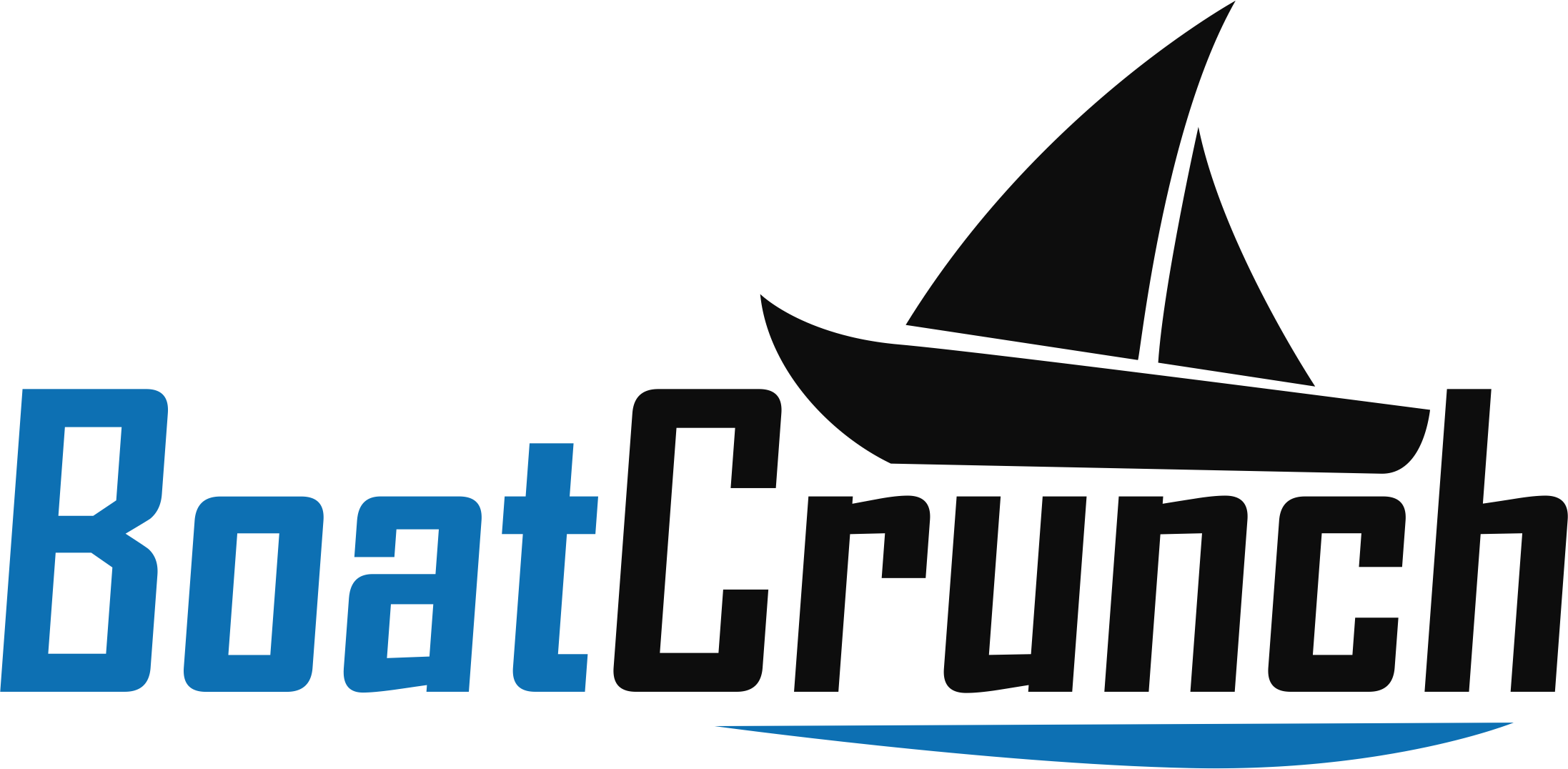
- Buyers Guides
- Product Reviews
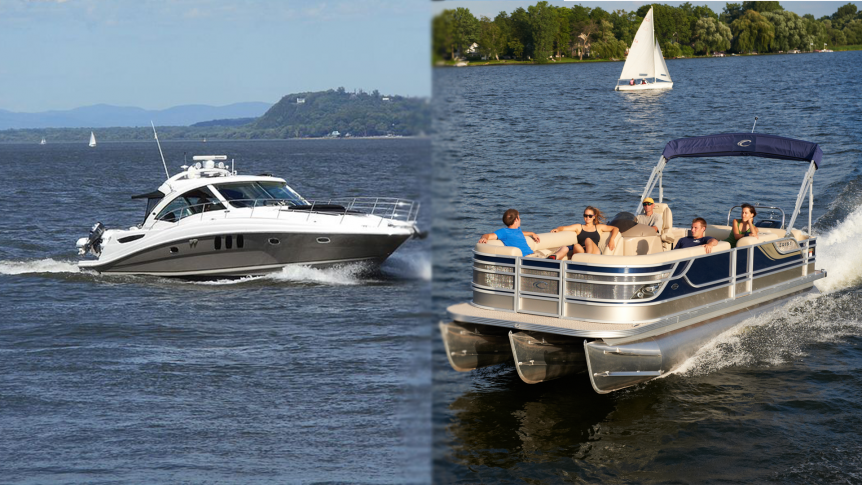
Deck Boat VS Pontoon Boat [Detailed Comparison]
As you’ve probably already figured out, there are many types of boats out there.
They’re all different in one way or another.
Of course, there are a few boats that are somewhat similar.
This is the case when it comes to deck boats and pontoon boats. Their similarities make it very difficult for many people to tell them apart. Nevertheless, there are some fine differences between them.
Once you’ve managed to pick up on these differences, you’ll be able to tell them apart easily. With that being said, you should read this guide and learn about the similarities and differences between deck boats and pontoon boats.
It’s Deck Boat VS Pontoon Boat, let the battle begin!
Size And Space Comparison
One of the main differences when it comes to the deck boat vs pontoon boat is the size and space.
Ultimately, both boats are similar in this area.
They’re going to offer plenty of deck space so you can kick back and relax in the sun. You and several others will be able to enjoy the day without feeling cramped.
Both are perfect for family boating holidays and trips!
Pontoon boats have a blank slate-style so to speak. This means that they’re designed to increase the amount of space provided to the occupants.
You’ll also be able to take advantage of square railings on a pontoon boat. This ensures that you’ll have plenty of space for your grill, kayak, and other items.
The deck boat will provide plenty of space too.
There is just one difference. The deck boat isn’t nearly as ergonomic as the competition. The deck boat can generally hold more people. However, you’re not going to be as comfortable as you would on a pontoon boat.
If you’re buying a boat for relaxation and entertainment, it is best to go with a pontoon boat. The deck boat is good for transporting people but not hanging out and having parties.
Look And Shape Comparison
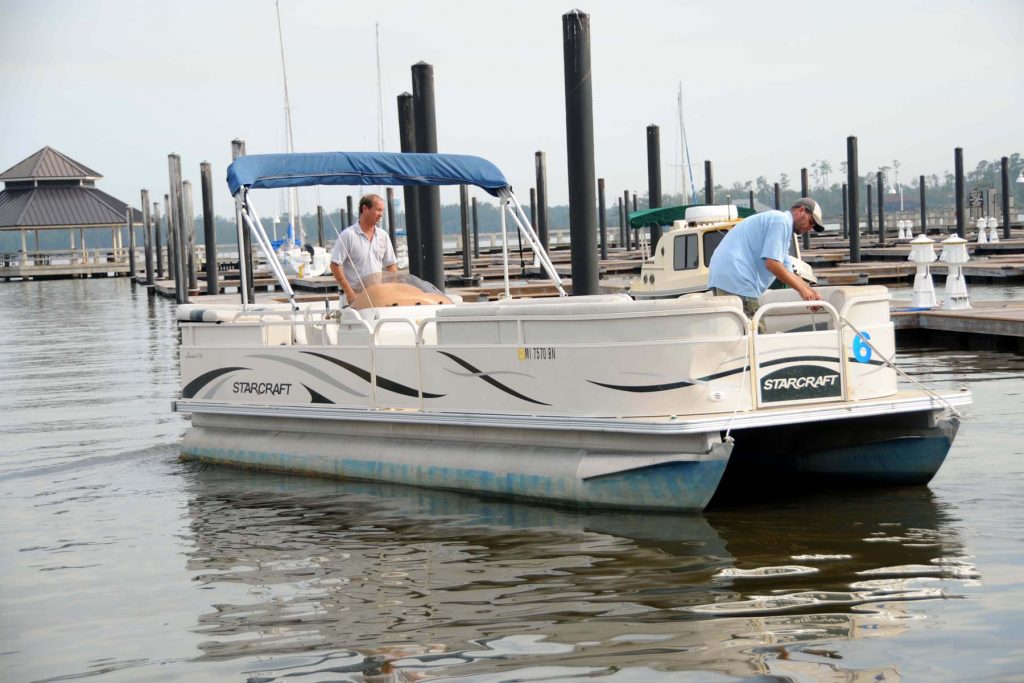
Once you’ve taken a look at pictures of both boats, you’ll be able to tell a clear difference. The pontoon boat has a rectangular shape. The deck boat looks like a triangle near the front.
In fact, the deck boat resembles a speed boat. The pontoon does not. It almost looks like a bed floating out on the water.
This might not seem like a good thing but there are pros and cons for both. So, which is the clear winner when it comes to the deck boat vs pontoon boat?
It depends on what you’re after. A deck boat has a more refined look but it isn’t nearly as comfortable. The pontoon boat is all about having fun and being relaxed.
If you’re buying a boat for your family, the pontoon boat is the best option for you. The deck boat is a good option for people who want to fish or just get some point A to point B.
Power And Performance Comparison
While your primary goal may be to find a boat you can enjoy leisurely, there is a good chance that you want that adrenaline rush too.
If so, you’ll need to find out which boat is going to feed your need for speed.
Both can reach high speeds and you can have fun driving either. However, there is a clear winner in this category and it has a lot to do with the shapes.
Since the pontoon boat is rectangular, its maneuverability is decreased a little bit. It isn’t going to move around as much.
Nevertheless, you’re going to feel safer in the pontoon boat. The flat deck will make you feel safer and more stable.
Ultimately, you’re going to feel much more comfortable on a pontoon boat but it will lack a little bit of power.
If you want to know more about the speed of a pontoon boat, Click Here to read my guide on the average speed of a pontoon boat, with examples included.
The deck boat is better here. As mentioned above, it features the same type of style as a speed boat. This gives it more speed and maneuverability. This makes it possible for the deck boat to speed through those waves without any issues. It will outperform the pontoon boat. If you’re interested in getting from the starting point to the destination as quickly as possible, the deck boat is your best choice.
This is also a good option for people who want to have fun on the water. You’ll also find that the deck boat makes it easier for everyone to remain in one place. On top of that, the deck boat is a better option for those interested in partaking in water activities.
Boat Usability Comparison
There is no doubt that you’re going to be interested in using your boat in various ways. Well, both of these boats are very versatile in this category. They can both be used for transportation, relaxation, and water activities.
However, you should know that each is better in specific areas. For instance, the deck boat is the best choice for transportation. The boat is faster and its shape makes it easier to maneuver.
The deck boat is better for water sports too. After all, it is faster and can provide participants with lightning-fast speeds. The pontoon boat is okay in this category but it cannot compete with the deck boat.
However, the pontoon is better in some specific categories. It is a good choice for people who want to cook on their boat. The pontoon can easily hold a BBQ grill . It is also the best choice for people who want to bring a kayak or two with them.
This is the best choice for hanging out in the sun too. The pontoon boat is more comfortable. You can lay down and enjoy the sun’s rays. Again, both boats off plenty of functionality. However, both excel in specific areas. You need to find out what you want to do with your boat and go from there.
Which Boat Is Easier To Maintain?
Ultimately, maintaining a boat is not easy. It is just as difficult as maintaining a vehicle or a home. It is going to require a lot of work and effort on your end.
Nevertheless, some boats are indeed easier to deal with than others. When you look at both boats, you’re going to notice that the pontoon will feature a lot of aluminum. This makes it much easier to clean.
If you’re interested in a guide in which I explain the most effective way to clean an aluminium boat, Click Here to check it out.
The deck boat will feature a fiberglass hull and that can be tougher to keep clean. Each time you take the deck boat out onto the water, you’ll need to clean the fiberglass hull. That can be a hassle.
If you don’t clean it carefully, you’re eventually going to be dealing with water spots. Those might not be easy to remove.
Cost Comparison
Depending on the size of boat and engine, a pontoon could cost anywhere between $18,000 and $65,000. The most popular size of the pontoon boat is 22 inches. To run this size pontoon, you will need at least a 90hp engine, which will set you back about $35,000.
I have an article in which I go into detail on the cost of a pontoon boat. You’d actually be surprised! Click Here to find it!
A deck boat can cost anywhere between $20,000 and $42,000, depending on the size and engine. On average, a 19.5-inch deck boat with a 10-person capacity will cost $30,000. A 21.6-inch deck boat with a 12-person capacity will cost a little under $42,000. The beam for most deck boats is 102 inches.
Deck Boat VS Pontoon Boat Conclusion
Pontoon boats and deck boats are similar in many ways. However, they are also very different in how they are designed.
Knowing these similarities and differences will help you decide which of the two will suit your needs and preferences better.
There is no doubt that boating is a great past time. But, if you do not have the proper rig, it could take a lot of excitement out of your adventure.
If you are looking for a smooth ride, you should opt for the deck boat. If you are looking for a laid-back adventure, you should opt for the pontoon boat.
If you’re interested to know more about Pontoon Boats, I have an guide in which I explain the pros and cons of Pontoon Boats . Check it out.
Hopefully, the information provided in this article will help you make a more informed decision for you.

My name Is Larry Noel, the voice behind BoatCrunch.
I’m a boating enthusiast that loves nothing more than being out on the water. So much so that I’ve acquired a Degree in Marine Biology (MB) as well as a degree in Ocean Engineering (OE).
I’m very familiar with a wide range of different boats and I’ve owned a variety of different boats myself however I have a particular obsession with Pontoon boats. I’ve lived all across the United States and always kept company in the form of boats and now my loving family.
Leave a Reply Cancel reply
Your email address will not be published. Required fields are marked *

Tritoon vs. Pontoon: Comparing Stability, Performance, and Price
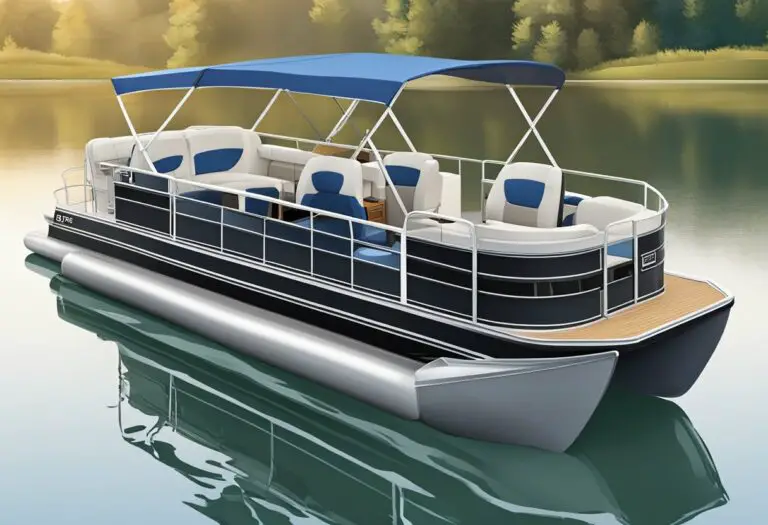
Tritoon vs. Pontoon Overview
Drawing on my 20 years of boating experience, let’s explore the differences between tritoon and pontoon boats. At a glance, the main distinction lies in the number of tubes. A pontoon typically has two tubes under the deck, providing a stable and leisurely boating experience, ideal for calm waters and casual activities. In contrast, a tritoon is equipped with three tubes , enhancing the vessel’s stability and performance, especially in rougher conditions.
Tritoon Advantages:
- Greater stability with three tubes
- Enhanced performance and handling
- Higher capacity for horsepower
- Suitable for choppier waters
Pontoon Advantages:
- Generally lower cost
- Simplified maintenance due to fewer tubes
- Adequate for peaceful, sheltered lakes
- Often lighter and easier to trailer
Performance-wise, tritoons offer noticeable improvements. With the addition of a central tube, tritoons can accommodate more powerful engines, making them faster and more agile. The added buoyancy is particularly beneficial when hosting larger groups or engaging in activities like water skiing.
For those considering cost and simplicity, pontoons might be preferable. Their classic two-tube design typically yields lower purchase prices and reduced maintenance. When the primary use is for leisurely cruises on calm waters, a pontoon boat suffices.
Choosing between a tritoon and pontoon centers on your intended use, performance desires, and budget. Although tritoons are generally pricier, their performance and capacity advantages are clear. Pontoons, however, continue to be a popular choice for their cost-effectiveness and ease of use.
Design Differences
When discussing pontoon and tritoon boats, it’s crucial to focus on their design variations, particularly concerning the hull structure and the implications for stability and handling.
Hull Structure
Pontoons and tritoons differ fundamentally in their hull configurations. A pontoon boat has two aluminum tubes, known as pontoons, which support a flat deck. In contrast, a tritoon adds a central third tube beneath the deck, which has significant performance implications. From my 20 years of boating experience, I’ve found this additional tube provides a tritoon with superior buoyancy and allows for larger engines to be fitted, enhancing the speed capabilities.
Stability and Handling
The stability and handling of a boat are directly affected by its hull design. Pontoons are known for their calm and stable ride in protected waters. Tritoons , on the other hand, have a noteworthy advantage in choppier conditions. This is due to the third tube, which not only increases buoyancy for a higher ride but also enhances the boat’s ability to cut through waves, providing a smoother experience at higher speeds. My personal observations corroborate that tritoons generally exhibit improved cornering at speed over their two-tubed counterparts.
Performance
Drawing from my 20 years of boating experience, I can affirm that the performance characteristics of pontoons and tritoons vary significantly due to their structural differences. Let’s look at speed and power, as well as maneuverability to understand how these factors affect each type of boat.
Speed and Power
Pontoons are traditionally powered by smaller engines and are designed for leisurely rides, making them suitable for calm waters and moderate speeds. At the heart of a pontoon’s performance is the understanding that they are optimized for stability, not speed.
On the other hand, tritoons , thanks to the extra buoyancy provided by a third tube, are capable of handling higher horsepower engines. This upgrade in power not only contributes to higher top speeds but also offers a boost in acceleration and overall performance. For instance, while pontoons might be limited to engines with up to 150 horsepower, tritoons can readily accommodate engines with 200 horsepower or more , fostering a more spirited ride.
Maneuverability
Maneuverability between these two types of boats can be quite distinctive. Pontoons often present a challenge in sharper turns or under windy conditions, due to their dual-hull design which tends to sit on top of the water.
In contrast, tritoons gain the upper hand with an additional hull improving balance and stability, leading to sharper and more controlled turning capabilities. This means tritoons demonstrate enhanced maneuverability, particularly at higher speeds or in rougher water conditions, without compromising safety or comfort. This can be attributed to the tri-hull configuration that cuts through water more effectively, offering boaters precision handling in diverse boating scenarios.
Capacity and Size
In my two decades of boating experience, I’ve learned that choosing the right boat hinges on understanding the distinction in capacity and size between pontoons and tritoons.
Passenger Space
Pontoons are well-known for their generous seating arrangements, typically accommodating groups comfortably. Most pontoon models range from 16 to 25 feet in length and can carry relatively large parties of up to eight guests , making them ideal for family outings and entertaining friends.
Load Capacity
Conversely, tritoons, with an extra tube for buoyancy , generally sustain higher weight limits . This additional tube allows tritoons to support larger groups and more gear. For example, certain tritoon models can handle engines up to 300 horsepower and carry additional fuel , translating to more capacity for passengers and equipment. This makes them particularly suitable for more intense water activities or longer excursions that require extra provisions.
Usage Scenarios
In my two decades of boating experience, I’ve observed distinct scenarios where choosing between a tritoon and a pontoon can impact your enjoyment on the water.
Recreational Activities
Pontoons are my go-to for leisurely cruises and family gatherings. With their flat decks and ample space, you can welcome aboard a crowd for socializing and sunbathing. The stability of a pontoon makes it an inviting space for meals and relaxation.
Fishing Expeditions
For fishing, pontoons offer accessibility and comfort, providing a stable platform with plenty of room for gear and fellow anglers. But, if I plan to navigate choppier waters or require higher maneuverability, tritoons, with their extra buoyancy and balance, provide a noticeable advantage to reach those prime fishing spots.
Watersports
When it comes to watersports, tritoons shine with their performance. Equipped with a third tube, they handle higher horsepower, which translates to better speeds for waterskiing, tubing, and wakeboarding. Their enhanced stability and weight distribution make them suitable for these adrenaline-pumping activities.
Cost Considerations
As someone with 20 years of boating experience, I’ve observed firsthand the financial aspects of owning different types of boats. When comparing tritoons and pontoons, it’s pivotal to evaluate both the initial purchase price and the long-term costs associated with maintenance and upkeep .
Initial Investment
Tritoons generally have a higher starting price . Expect to invest at least $35,000 for a new tritoon, with luxury models climbing significantly higher in price. For instance, based on the information from Bennington Marine , the cost for a Bennington tritoon can exceed $200,000 for top-tier models. In contrast, the initial cost for a pontoon boat is usually lower, with the average price ranging between $15,000 to $60,000 .
Maintenance and Upkeep
The cost for maintenance and upkeep can also vary between the two. Generally, tritoons demand a higher budget for not just purchase but also ongoing costs due to additional complexity like the third tube. They can require larger engines and more resources for upkeep. On the flip side, pontoons, while still necessitating regular maintenance, can be slightly more economical due to their simpler construction and often smaller engines. The costs can fluctuate based on usage, but in my experience, allocating around 20% of the boat’s value over a 5-year period is a sensible budget for maintenance, repairs, and potential upgrades .
Resale Value and Depreciation

With 20 years of boating experience , I’ve observed how both Tritoons and Pontoons depreciate over time. It’s key to understand that the resale value of these watercrafts is influenced by numerous factors, such as maintenance, market demand, and brand reputation.
Tritoons tend to hold their value slightly better than Pontoons due to their enhanced performance and stability. However, all boats experience depreciation, and it’s a gradual process from the moment of purchase.
For Pontoons, you can expect an initial depreciation of roughly 20% to 30% within the first few years of ownership. This is consistent with the average figures reported. After the initial period, a Pontoon boat’s value typically decreases at a slower rate, around 4% to 5% annually.
Here’s a brief overview comparing depreciation rates:
My personal experiences reinforce these statistics, and it’s crucial for new buyers to factor in the choice between a Pontoon and a Tritoon concerning their budget and expected depreciation.
While brand , model , and upkeep can alter these figures, Pontoons generally experience a faster depreciation than their Tritoon counterparts. This difference is also reflected in their respective resale values . However, a well-maintained boat of either type can command a stronger resale value, emphasizing the importance of care and regular maintenance.
Pros and Cons
Drawing from my 20 years of boating experience, let’s examine the specific advantages and limitations of pontoon and tritoon boats to help you make an informed decision.
Advantages of Pontoons
- Affordability : Pontoons generally have a lower starting price, making them more accessible for those with a limited budget. The cost savings can be significant when compared to similarly sized tritoons.
- Simplicity : With two tubes and often less powerful engines, pontoons are easier for maintenance and operation, ideal for leisurely cruising and calm water outings.
Advantages of Tritoons
- Performance : A tritoon’s additional center tube provides better stability, allowing for higher power engines and improved handling, especially in rough waters.
- Capacity : The buoyancy of a third tube means a higher load capacity , which translates to more passengers and gear without sacrificing performance.
Limitations of Pontoons
- Handling : Pontoons can feel less stable than tritoons in choppy conditions, potentially limiting their use in varied water environments.
- Speed : Generally, pontoons are not designed for high-speed activities, such as water skiing or wakeboarding, due to the limitations of their two-tube design.
Limitations of Tritoons
- Cost : With improved performance and capacity comes a higher price tag, both in purchase cost and potential fuel consumption due to larger, more powerful engines.
- Complexity : Tritoons require more intricate engineering and design. This complexity can reflect in increased upkeep requirements and operational considerations.
Frequently Asked Questions

Drawing from my 20 years of boating experience, I’ll address some common queries related to tritoon and pontoon boats. My insights should help clarify the distinctions that impact usability, cost, performance, and value.
What are the advantages of owning a tritoon compared to a standard pontoon boat?
Tritoons are renowned for their enhanced stability and buoyancy, which comes from the additional third tube. This design enables them to support more weight and handle rougher waters more effectively than traditional pontoons.
How does the cost of a tritoon compare to a traditional pontoon?
Typically, tritoons are priced higher than pontoons due to their additional materials and construction complexity. However, the investment correlates with the tritoon’s increased performance and capabilities.
Can you achieve higher speeds with a tritoon than with a pontoon boat, and what factors contribute to this?
Yes, tritoons often reach higher speeds because their extra hull reduces water resistance and supports more powerful engines. These factors, combined with better buoyancy, allow tritoons to glide more efficiently at higher velocities.
In what ways does a tritoon potentially provide better value for the investment over a pontoon?
A tritoon’s superior construction offers better handling, increased passenger capacity, and an ability to mount more powerful engines, which can translate into a higher resale value and prolonged durability for my investment.
What are some potential drawbacks to consider when purchasing a tritoon boat?
The initial cost is a significant factor; moreover, the increased size of tritoons can incur higher storage and trailering expenses. They may also require wider docks and more maneuvering room.
Is a tritoon suitable for marine environments, such as ocean use, compared to a regular pontoon?
Tritoons have a design better suited for varied water conditions, including marine environments. Their enhanced stability can make them more reliable than pontoons for coastal waters, though weather and sea state will dictate their suitability.
Leave a Comment Cancel reply
Save my name, email, and website in this browser for the next time I comment.
Keep in mind that we may receive commissions when you click our links and make purchases. However, this does not impact our reviews and comparisons. We try our best to keep things fair and balanced, in order to help you make the best choice for you.
As an Amazon Associate, I earn from qualifying purchases.
Vanquish Boats
500 Lewis Drive Carolina Beach, NC
+1 910-707-3599
© Vanquish Boats
- English United States - English
- English Canada - English
- Français Canada - Français
- Norwegian Norway - Norwegian
- English Australia - English
- English New Zealand - English
- Finnish Finland - Finnish
- Swedish Sweden - Swedish
- Create Account
- Dealer Login
- Check Order Status
Back to all articles
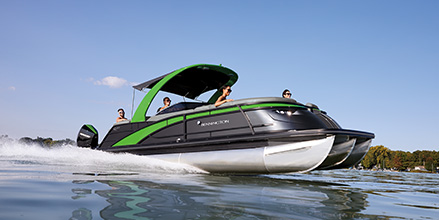
Tritoon Vs. Pontoon: How Are They Different?
Deciding you want a boat to take your friends and family out on the water is easy. Determining what boat is best for you — a pontoon or a tritoon — is tougher.
Luckily, understanding the differences between a pontoon and a tritoon is easier than you think. Once you know the distinctions, your choice will come down to your personal preferences and lifestyle.
What is a Tritoon Boat?
A tritoon boat is a pontoon boat with three tubes instead of two. It sounds simple enough, but the third tube makes a big difference in the performance and ideal use for the boat. Here’s why you may consider a tritoon over a pontoon and how the two compare.
Triple Pontoon Boats
You’ve likely heard of tritoons and tri-hull pontoon boats. What you may not have realized is that they’re actually the same thing. While a pontoon boat has two tubes beneath the deck, a tritoon boat has three. This third hull helps keep the boat stable, allows for quicker speeds, and makes the boat better equipped for choppy water.
Is a Tritoon Better than a Pontoon?
So, which is better? Neither. Since pontoons and tritoons have several differences, it just depends on what you’re looking for.
Consider what kind of activities you’ll be doing on the water, what your budget is, what size and layout you’d like your boat to have, and the location of where you’ll be boating. If you plan to boat on rough water, consider a tritoon. Tritoons are built to withstand rough waves and work better for watersports.
Difference Between Pontoon and Tritoon
Not everyone prefers a tritoon over a pontoon and vice versa. It all comes down to your lifestyle. Do you dream of easy cruising, picture yourself waterskiing with friends, or just want to leisurely fish? This and more all factor into which boat you’ll want.
Tritoon Speed and Horsepower
If you’re someone who believes the faster the better, you’ll love a tritoon. Since tritoons have the ability to distribute weight evenly due to their three tubes, they can handle more horsepower.
Bennington boats have engines that range from 90 horsepower on S Series models to up to 900 horsepower with twin engines on Bennington’s more luxury lines, such as the Q Series, which includes tritoons.
Bennington offers a wide variety of performance packages, engine choices, and high-performance features to kick things up another notch.
Often, state and local boating authorities enforce speed limits, but regulations can vary from state to state. Contact your local and state boating authorities to be sure you’re operating at a safe speed.
Tritoon Weight and Capacity
The exact capacity of a tritoon boat depends on the size, but tritoons are able to accommodate more people due to the third toon.
A 23- to 28-foot boat will be able to carry up to 15 people, and Bennington’s 30-foot boats can hold up to 21 people. It’s important to make sure people are spread out on your boat, not crowded to one side or one area. The capacity plate on your boat should be easy to find, but also talk to your dealer about the carrying capacity of the boat.
The actual size and weight of the boat itself is also important when considering how you’ll store your boat or transfer it to and from the water. With only two tubes, pontoons are lighter, making them easier to attach to a trailer. With a tritoon, the added weight means you need a vehicle that can handle towing it.
Tritoon vs Pontoon on Rough Water
Pontoon boats are designed for casual, calm cruising on sheltered water. Waves bigger than two feet can be dangerous on a pontoon boat.
When it comes to rough water, the more hulls the better. Tritoons can handle rough, choppy water better than pontoons because the third toon on a tritoon helps stabilize the boat and allows for more friction between the water and the bottom of your boat. If you’ll be on rough water, open water, or docking in choppy waters, a tritoon is a better option for you.
Which Should You Buy: Tritoon vs Pontoon?
When it’s time to decide, it comes down to the size, use, and price that fits your needs and budget.
If you want a bigger, faster boat, opt for a triple-tube pontoon boat. On average, tritoon boats are between 22- and 30-feet long and can carry 10 to 21 people.
Remember that because tritoons are bigger, you’ll also need more storage space when it’s out of the water.
Basic cruising, relaxing on the water, and fishing are perfect activities for a pontoon boat.
Since tritoons are stable and perform well, they’re a great choice for watersports like tubing, waterskiing, or wakeboarding. Tritoons are better in rough waves, so, take into consideration what kind of body of water you’ll be boating on.
The third hull on a boat makes a difference in price. Pontoons tend to be a more affordable boat option. Overall, Bennington pontoon boats range from about $17,000 for the SV Line to more than $200,000 for boats in the Q Series.
Bennington pontoons and tritoons come at a variety of price points to fit your budget. You can explore features, pricing, layouts, materials, and more online to build your dream boat and find out its cost.
- Education & Basics
- Watersports

Buying a pontoon is a large purchase and can be overwhelming if not prepare...

Buying a boat is a large purchase and an important one to get right. Read h...

It can seem tricky to figure out exactly how much your boat will cost you,...

Are you in the market for a pontoon boat? It can hearten you on long, dark...

IMAGES
VIDEO
COMMENTS
The option of outboard or I/O propulsion is a big plus for deck boats as well, depending on your needs. Even with a full load, pontoon boats (by design) are going to plane easily with less horsepower than a deck boat. Sharp turns are helped by the addition of hydraulic steering systems, but you will still cut a wider swath in a pontoon, unless ...
Interestingly, the deck boats design was actually based off of the pontoon boat and the typical fiberglass boat. With so many boaters and their families going gaga over the pontoon boat design, manufacturers thought it would be a good idea to exchange the double-hull tubes with a streamlined V-shaped hull without sacrificing deck space. And so in 1974, the faster yet equally spacious deck boat ...
Best uses: dive boat or work boat. Dinghy— These are small boats, sometimes less than 10 feet long. They can be powered "manually," by oars or even by a small outboard motor. Best uses: transportation to larger boat at anchor or as a "first boat" for children. Inflatable— Inflatable boats are made of coated fabric.
The only other boat I've been on that's been as comfortable as my pontoon was a yacht. When it comes to affordable family boats, the pontoon is one of the most comfortable, hands down. ... Check out my guide on Tritoons vs Pontoons! Rough Water. Pontoon boats a very safe when it comes to smaller waves and calm water. They're very stable ...
Pontoon boats will also provide a drier ride while underway than a deck boat. This is because it sits higher out of the water. When comparing agility under cruising speed, the deck boat tends to be much more nimble. It can make sharp turns and quick reactions. Pontoon boats tend to make wider, gentler turns.
Like pontoons, deck boats vary in prices based on length, layout and options. Since they are more utilitarian than the higher end pontoon boats, deck boats typically are a little more affordable than the most expensive pontoons. Inboard/outboard deck boats will be a little more expensive than comparable outboard powered deck boats.
Pontoon boats were first crafted in the mid 1900s to be vessels would be more stable on a lake than a typical boat. With two tubes and a flat deck, pontoon boats are great for both a slow, entertaining ride around the lake and fun-filled watersports activities. Pontoon boats are often in high demand, particularly for inland water locations.
Although both were built to accommodate large groups, deck boats are built on a more traditional fiberglass V-shaped hull, while pontoons are built on aluminum tubes. While the latest pontoons have new tube designs and come close to performing comparably, a deck boat's traditional hull design still rides better in rough waters, cruises more ...
Pontoon boats are powered by outboard motors but take less horsepower to plane than a deck boat. While pontoon boats can be used for watersports, their wide beams make them less maneuverable, and they make wider turns. If you are looking for lots of space to fish, grill, relax after swimming, or watch the sunset on the lake or ocean, a pontoon ...
What is a Deck Boat. Building on the incredible layout options of pontoon boats, deck boats offer exceptional comfort, but on a more traditional powerboat hull. This innovative design lets guests enjoy the comfort of ample seating, with the maneuverability and cornering of a center console. The more aerodynamic hull design also handles slightly ...
Pontoon boats have gone up in value and some top of the line pontoon boats with high quality features may end up being as much or more than similarly outfitted deck boats. A 24 foot Party Barge pontoon boat with an 11-person capacity can set you back $52,000.
Bennington pontoon boat sizes range from 17 to 28 feet. The surface area of pontoons can hold many people, but pontoon boat capacity varies on the size. Up to about eight people can fit on a 17- to 19-foot boat and around 13 people can fit on a 20 to 22-foot boat. If you really want to get the party started by entertaining a group of 15 people ...
The main difference between a deck boat and a pontoon boat can be found in one simple technical factor: deck boats have a single rigid hull, while pontoon boats have a deck riding on pontoons that act as the hulls. Beyond this, the two boats serve relatively similar functions and niches in the boating world, yet there are numerous details that ...
The flat hull keeps the boat steady in the water, both while moving and sitting still. Deck boats, however, use v-hulls, which cut through the water while moving, allowing deck boats to accelerate more quickly than traditional pontoons. A pontoon boat trying to reach the same speed as a deck boat will require more fuel to do so; however ...
You can't take a pontoon boat out on the open water, but a catamaran can handle both open and shallow water. These vessels range from around 40 to even 145 feet in length. Intended Use. Pontoon boats are great for short-term social gatherings, fishing, and watersports like skiing and tubing. They are intended to be used as recreational ...
Almost all pontoon boats ride on floats made of aluminum. Aluminum is a ductile metal that is both corrosion resistant and very tough. Painting is optional since a corrosion-resistant film of aluminum oxide forms on the untreated surface. At 170 lbs per cubic foot, it is about one third the weight of steel.
Additionally, deck boats tend to "wander" a bit more at lower speeds, making steering the boat a little more difficult. Sitting higher off the water in a pontoon boat also helps with spray. You are less likely to get wet in a pontoon than you are low to the water in a deck boat.
In fact, deck boat designs were an industry reaction to pontoon boats back in the 1970s. The primary difference is the v-shaped hull design versus the dual or triple tube design, rather than a pure deck boat vs pontoon boat comparison. Both boats are family-friendly designs and popular with that corner of the market. Deck Boat vs Pontoon Boat
The average size of a bass boat will sit at about 17 - 24 and will weigh anywhere from 1500-1700 pounds according to Fast Cast Rods. A pontoon boat will weigh around 2,200 pounds and will sit at 20-31 feet according to Pon toon Boats. Longest/Heaviest. Pontoon Boat.
A deck boat can cost anywhere between $20,000 and $42,000, depending on the size and engine. On average, a 19.5-inch deck boat with a 10-person capacity will cost $30,000. A 21.6-inch deck boat with a 12-person capacity will cost a little under $42,000. The beam for most deck boats is 102 inches.
2023 Bennington 30QX. Twin engines can take the above 2023 Bennington QX30 north of 60-mph. Image Credit: Bennington. Sticking to the top of our list of best pontoons this year is Bennington's 30QX. Known for its distinctive style, she can fly across the water at speeds of over 60-mph with powerful twin-engine options.
Tritoon vs. Pontoon Overview. Drawing on my 20 years of boating experience, let's explore the differences between tritoon and pontoon boats. At a glance, the main distinction lies in the number of tubes. A pontoon typically has two tubes under the deck, providing a stable and leisurely boating experience, ideal for calm waters and casual ...
The third hull on a boat makes a difference in price. Pontoons tend to be a more affordable boat option. Overall, Bennington pontoon boats range from about $17,000 for the SV Line to more than $200,000 for boats in the Q Series. Bennington pontoons and tritoons come at a variety of price points to fit your budget.